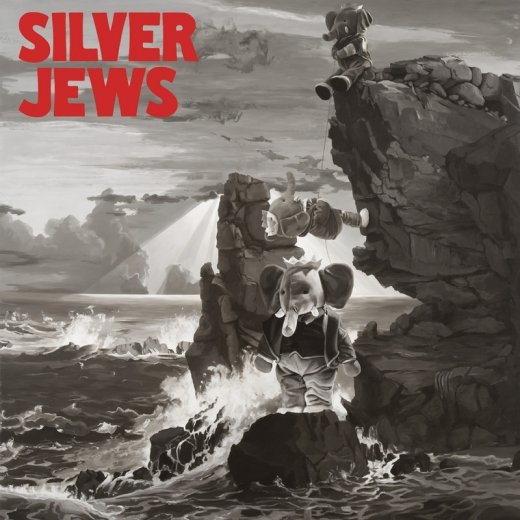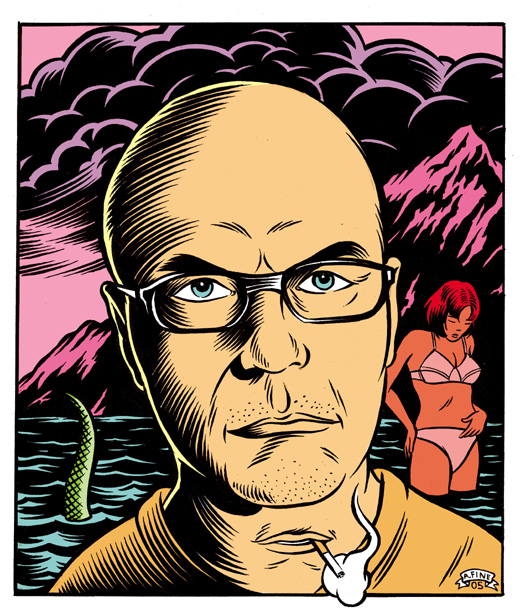
Q&A: Meet The Real Mr. Burns
[As Told To JONATHAN VALANIA]
1. Though born and bred in the high rainyland of the Pacific Northwest, Charles Burns has resided in Philadelphia — Northern Liberties, to be exact — for the past 21 years. “Well, the view out my studio window has changed a bit,” he says, when asked how the ‘hood has evolved over the years. “It used to be homeless guys pushing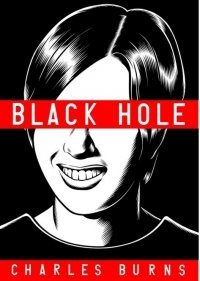 shopping carts, now it’s mothers pushing strollers.”
shopping carts, now it’s mothers pushing strollers.”
2. Mr. Burns is probably the most important graphic novelist of his time. He we would never agree to this, so don’t bring it up if you see him.
3. The monster-fying sex plague afflicting the horndog stoner teens — half-remembered, half-made-up stand-ins for the friends and exploits of his gloriously misspent youth circa mid-70s Seattle — that people the dark core of Black Hole is not really a metaphor for AIDS. But you would be forgiven for thinking so. “I suppose you can’t write a story about a sexually-transmitted disease without somebody asking you that, but really I just put that in to add to the sense of alienation and the desperation of these circumstances. If it’s a metaphor for anything it’s my tormented adolescence.”
4. Mr. Burns thinks women with tails are sexy. And he will make you think so, too. One of the characters in Black Hole is a beautiful and mysterious artist with more than just the usual junk in the trunk. “I think there is something alluring about it,” he says. “From time to time I do get women coming up to me and telling me how they had a tail when they were born.” Fascinating, captain.
5. Mr. Burns is married to Susan Moore, a painter and fine arts professor at Tyler School of Art. She does not have a tail. Together they have two daughters, aged 18 and 21. “Um, yeah, I guess they are grown-ups,” he says when asked for confirmation. “I am still trying to get used to that idea. It just kinda happened.”
6. Mr. Burns has TERRIBLE handwriting — “Even when I try really hard,” he says with mild exasperation — which is odd for one so adept at drawing clean and exacting lines with pen and ink. But as such, it falls to his wife to do all the lettering in his comics. “I had been sweating over a page for hours, trying to get the lettering to look good, and my wife looked at it and said ‘that looks REALLY terrible’, and I said something to the effect of ‘if you think you can do better…’ and she’s been doing it ever since.”
7. It takes a LONG time to make Black Hole. Serialized through the 90s in 32-page comic book installments once or twice a year, Black Hole has since been published in complete book form (just out in paperback!). It took Mr. Burns the better part of a year to finish each 32-page installment. “But that wasn’t working on it all day, every day,” he clarifies. “You see, the comics aren’t really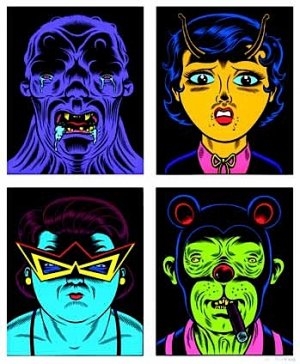 my day job. My day job is being an illustrator.” He is referring to the mesmerizingly weird, yet high-profile illustration work he does for the likes of Time, Coca Cola, The New Yorker, Altoids, The New York Times and The Believer. An admitted insomniac with a fairly tireless work ethic, Mr. Burns often begins his work day at three in the morning.
my day job. My day job is being an illustrator.” He is referring to the mesmerizingly weird, yet high-profile illustration work he does for the likes of Time, Coca Cola, The New Yorker, Altoids, The New York Times and The Believer. An admitted insomniac with a fairly tireless work ethic, Mr. Burns often begins his work day at three in the morning.
8. Mr. Burns is very stingy selective with his seal of approval. He is too nice to mention all the bands he declined to draw album covers for, but Iggy Pop is not one of them. “Virgin didn’t have to ask me twice,” says Mr. Burns, an avowed Stooges fan, when asked how he wound up drawing the cover to Iggy’s Brick By Brick. “So basically they were like ‘Do a cover, show it to Iggy and if he likes it we’re done.’ So they give me the address and I go up to New York. Iggy was very nice and normal and it just so happened that Allen Ginsberg was visiting when I showed up. So we all sat around and looked at the cover. Iggy just laughed. I took that as a yes.”
 9. He recently finished work on an animated feature-length film called Peur(s) Du Noir (Fears Of The Dark). Mr. Burns is one of six artists (and one of only two Americans) invited by a French production company to write, direct, and shoot a segment of the highly expressionistic film. Peur Du Nour will premier at Sundance later this month. Up until a couple days ago, Mr. Burns was slated to attend the premier but the whole thing turned into a great big time suck, and he’s already well into the follow-up to Black Hole. Besides, not his scene, baby.
9. He recently finished work on an animated feature-length film called Peur(s) Du Noir (Fears Of The Dark). Mr. Burns is one of six artists (and one of only two Americans) invited by a French production company to write, direct, and shoot a segment of the highly expressionistic film. Peur Du Nour will premier at Sundance later this month. Up until a couple days ago, Mr. Burns was slated to attend the premier but the whole thing turned into a great big time suck, and he’s already well into the follow-up to Black Hole. Besides, not his scene, baby.
10. In closing, Mr. Burns has never killed anyone, has never voted Republican, and does not believe in God. He does recycle, is well-liked by animals and small children, and he went to college with Matt Groening . He is curiously cagey about whether or not the character of Charles Montgomery Burns is in fact named after him. “You’d have to ask Matt,” says Mr. Burns. “But I will say this, one time I was at some public event [with Groening] and somebody in the audience asked that very question. Matt said, ‘You have to ask my lawyer.’”
does recycle, is well-liked by animals and small children, and he went to college with Matt Groening . He is curiously cagey about whether or not the character of Charles Montgomery Burns is in fact named after him. “You’d have to ask Matt,” says Mr. Burns. “But I will say this, one time I was at some public event [with Groening] and somebody in the audience asked that very question. Matt said, ‘You have to ask my lawyer.’”
***
Q&A: 12 Useful Facts About Juno’s Kimya Dawson

[As told to JONATHAN VALANIA/Illustration by ALEX FINE]
1. Kimya Malaika Dawson’s name means ‘Quiet Angel’ in Swahili. She is not, however, Swahili. It was all her parents idea. Obviously.
2. Miss Dawson’s 18-month-old daughter is named Panda Delilah Dawson. “There was no second choice, it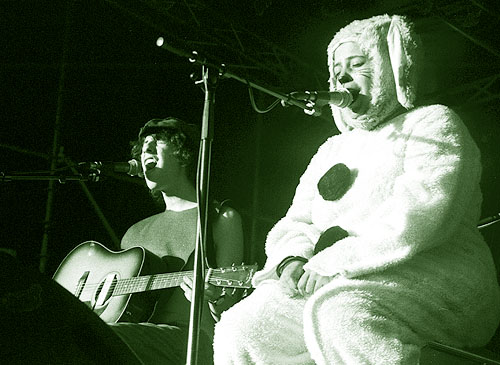 was certain from the beginning that it was gonna be ‘Panda Delilah’ whether it was a boy or a girl,” says Miss Dawson, explaining that Tom Jones was playing when she went into labor. Not in concert, on the stereo. Obviously.
was certain from the beginning that it was gonna be ‘Panda Delilah’ whether it was a boy or a girl,” says Miss Dawson, explaining that Tom Jones was playing when she went into labor. Not in concert, on the stereo. Obviously.
3. All of Miss Dawson’s songs on the Juno soundtrack were originally written for Panda Delilah’s benefit. Except for “Anyone Else But You”, which is from her days in the Moldy Peaches with Adam Green. Obviously.
4. On tour, Panda Delilah is Miss Dawson’s co-pilot. Along with her husband, the ‘one man band’ Angelo Spencer. They like to be gone most of the time — they have been to 12 states and 11 countries together. And they don’t see what anyone could see in anyone else. Obviously.
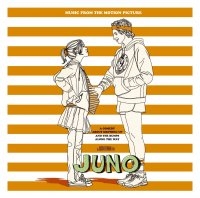 5. Miss Dawson’s knuckles are tattooed with the words LAFF LOUD. “I was all set to go with LOST SOUL and then at the last minute I thought, ‘this is gonna be with me the rest of my life,” says Miss Dawson. Obviously.
5. Miss Dawson’s knuckles are tattooed with the words LAFF LOUD. “I was all set to go with LOST SOUL and then at the last minute I thought, ‘this is gonna be with me the rest of my life,” says Miss Dawson. Obviously.
6. Miss Dawson disagrees with those who contend Juno, and for that matter Knocked Up, are de facto ‘Pro-Life’ movies. “Having a baby isn’t ‘Pro-Life‘ — it’s just natural,” she says. “If anything, the fact that the movie discusses abortion and it is an option for Juno makes it a Pro-Choice movie.” Obviously.
7. “Um, no,” says Miss Dawson when we ask if, like, she knows Diablo Cody [pictured, below right] and could help arrange a Win A Dream Date With The Hottie That Wrote Juno promotion for Phawker. But we had to ask. Obviously.
8. It was Ellen Page [pictured, upper left, with child] who urged director Jason Reitman to use Miss Dawson’s music. Miss Dawson says she will NOT be helping to arrange a Win A Dream Date With Ellen Page contest for us, either. Obviously.
will NOT be helping to arrange a Win A Dream Date With Ellen Page contest for us, either. Obviously.
9. Miss Dawson tells us that the Moldy Peaches are on semi-permanent hiatus and fans shouldn’t hold their breath for a reunion any time soon. “If we do, it would be like in 50 years,” she says. Later, Miss Dawson excitedly tells NPR that Moldy Peaches are reuniting for an appearance on The View on Monday One of these statements is a lie. Obviously.
10. The Moldy Peaches self-titled debut was released on September 11th, 2001. That sucked. The terrorist attack, not the album. Obviously.
11. Jamie-Lynn Spears is a big fan of the Juno soundtrack, according to the New York Post. Miss Dawson could not be more pleased, no matter what Howard Gensler says. Obviously.
12. Miss Dawson’s matinee show Saturday at the Ethical Society is WAY sold out. But lucky for you she will be performing at AKA MUSIC 7 pm tomorrow night. It’s free. Obviously.
MOLDY PEACHES: The Ballad Of Helen Keller
***
Q&A: The Horrible Truth About Dan Deacon

[Photo by STEFANI LEVIN]
WIKIPEDIA: Dan Deacon (born 1981) is a Baltimore, Maryland-based electronic music composer/performer. He attended the Conservatory of Music at Purchase College in Purchase, New York, where he played in many bands, including tuba for Langhorne Slim and guitar in the improvisational grindcore band Rated R, and completed his graduate studies in electro-acoustic and computer music composition. He studied under composer/conductor Joel Thome. Currently, he lives at Wham City in Baltimore, Maryland. Dan Deacon’s compositional style is best classified in the future shock genre along with Videohippos, Santa Dads, Blood Baby, Ecstatic Sunshine, Ponytail, and other bands in the growing Baltimore music scene. MORE
PHAWKER: Have you ever been arrested?
DAN DEACON: Yeah. The last time I almost got arrested I was walking through the woods in Baltimore along the light rail. I was walking along the tracks. I was dressed kind of insanely, wearing a women’s dress. Or actually it looked more like a lamp shade with flowers on it. I was on a weird diet at the time. I was eating olive oil and raw oysters. The cops came. I guess it’s illegal to walk around the tracks. They thought I was actually retarded. They were like ‘WTF is this guy doing?!?’ I had no idea what was going on. I had to go to court and shovel garbage in a dump for a day. Turned out it was for this toxic waste dump that we had to clean up for the mayor so he’d look like he was keeping things clean.
the light rail. I was walking along the tracks. I was dressed kind of insanely, wearing a women’s dress. Or actually it looked more like a lamp shade with flowers on it. I was on a weird diet at the time. I was eating olive oil and raw oysters. The cops came. I guess it’s illegal to walk around the tracks. They thought I was actually retarded. They were like ‘WTF is this guy doing?!?’ I had no idea what was going on. I had to go to court and shovel garbage in a dump for a day. Turned out it was for this toxic waste dump that we had to clean up for the mayor so he’d look like he was keeping things clean.
PHAWKER: About your dance moves — there’s something in PW that says people who go to your shows act really, really white.
DAN DEACON: I think the media segregates music more than music does. I think the main goal in the composition is to create an environment where people don’t care how they dance or how they look. The media creates inhibitions and cautiousness about race and gender and style and weight and stuff like that and I think they’re a major problem. I don’t really enjoy the media. They can go fuck themselves. The way people dance at my shows says that. It says go fuck yourself. They don’t want to dance sexy or whatever. They want to dance however they want. Whatever feels good.
PHAWKER: What are your five favorite non-musical sounds?
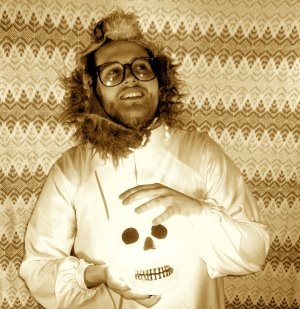 DAN DEACON: Last night we were in this weird truck diner in Providence and there were a lot of goopy frying sounds, like sizzling goop. I liked that. But from the Cage-ian school of sound everything is music. I guess that’s kind of a cop-out answer. I really like the sound of crowds talking, the shuffling of feat. Have you ever sat in a stadium and just listened to the ambient noises? Pencil writing on paper. I like that too.
DAN DEACON: Last night we were in this weird truck diner in Providence and there were a lot of goopy frying sounds, like sizzling goop. I liked that. But from the Cage-ian school of sound everything is music. I guess that’s kind of a cop-out answer. I really like the sound of crowds talking, the shuffling of feat. Have you ever sat in a stadium and just listened to the ambient noises? Pencil writing on paper. I like that too.
PHAWKER: Have you ever given or been given a swirlie?
DAN DEACON: What’s a swirlie?
PHAWKER: I’ll take that as a ‘no’. Have you ever knowingly killed anyone?
DAN DEACON: Not successfully.
PHAWKER: What’s the best present you’ve ever received?
DAN DEACON: My ex girlfriend gave me a cello a few years ago. I’d like to learn but we broke up right after. So it sort of felt like an anchor after that. Hmm…what else? The gift of literacy?
PHAWKER: Last book you read?
DAN DEACON: Rule By Secrecy by Jim Marrs. My friend Connor recommended it. It’s about conspiracy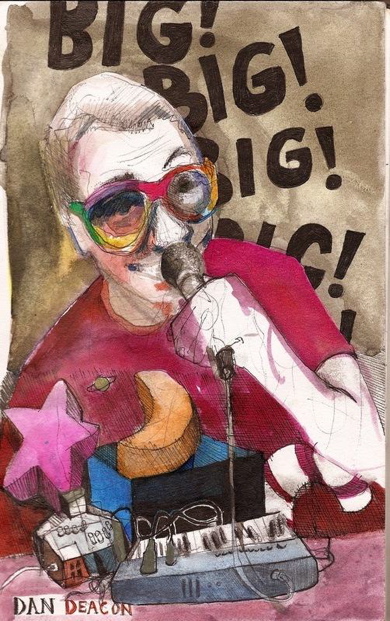 throughout the ages. Which is something I’ve always been interested in.
throughout the ages. Which is something I’ve always been interested in.
PHAWKER: What’s your take on Philly?
DAN DEACON: Philly is one of the first cities where the audience heard the sound and felt it happening and passed it on. There was a show at Big Pink in South Philly. It was my second show in Philly. It was rad. I met a lot of cool people, made some friends. I’ve liked Philly ever since.
PHAWKER: Good answer. What drugs are you on while making videos with Jim Roche?
DAN DEACON: None. There isn’t really much to it. We’ve been collaborating for the past eight years or so. We were roommates. We are still currently roommates. We’re already working on Ultimate Reality Two. It’s called Take it to the Max.
PHAWKER: Dan, thanks for coming on the blog today. Really. Any last words?
DAN DEACON: I enjoy when people propose for marriage at my shows. Not to me. To other people. It happened in Chicago at the Metro. And now they’re getting married. They approached me the night before and asked if they could I propose during my set. And we worked out this routine where we tied a mic to a rope and lowered it down and stuff. It was awesome. [As told to EVA LIAO]
DAN DEACON & JIMMY JOE ROCHE
***
Q&A: Dancing With The Devil & Daniel Johnston
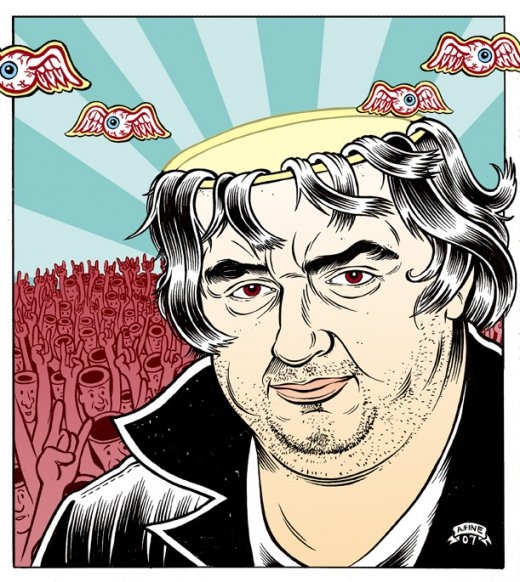
WIKIPEDIA: Daniel Dale Johnston (b. January 22, 1961) is an American singer, songwriter, musician, and artist. Johnston was the subject of the 2005 documentary The Devil and Daniel Johnston. He currently lives in a house adjacent to his parents’ home in Waller, Texas.Johnston has been diagnosed with bipolar disorder and is autistic.[1] His songs are often called “painfully direct,” and tend to display a blend of childlike naïveté with darker, “spooky” themes. MORE
Phawker: Hi. How are you?
Daniel Johnston: Good. I just woke up. And I just found a bunch of comic books I haven’t even looked at yet. I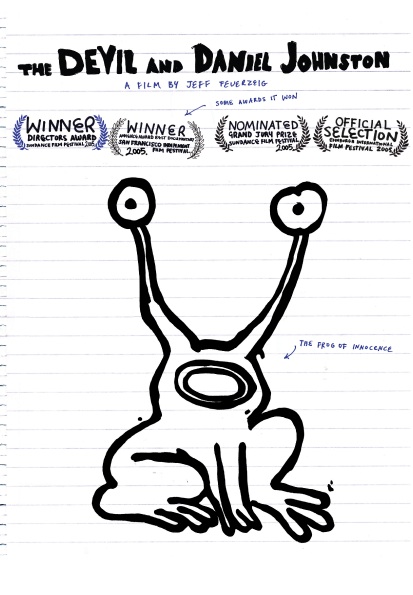 found them in the attic. I’m very excited.
found them in the attic. I’m very excited.
Phawker: So what’s your typical day like these days?
Daniel Johnston: Typical day? I usually wake up around 5:30 in the afternoon from staying up late the night before. I draw pictures a lot. Watch monster movies. Play piano and guitar [at this point his mother begins yelling something unintelligible from downstairs, she will do this every few minutes all through the interview] Last night I watched A Clockwork Orange again. I like The Shining too. One of the best films ever made. King Kong, the 1933 version, is still one of my favorites. And King Kong vs. Godzilla, Frankenstein Meets the Wolf Man, Taste the Blood of Dracula with Christopher Lee. Those are some of my favorites.
Phawker: Do you consider yourself famous?
 Daniel Johnston: I don’t consider myself famous. But when a girl at the store says, “Hey, it’s that guy from the movie” I like that. I’d rather be known as an artist than a celebrity, anyway. Like Pablo Picasso. I’m not a Hollywood squares type. I’m into art.
Daniel Johnston: I don’t consider myself famous. But when a girl at the store says, “Hey, it’s that guy from the movie” I like that. I’d rather be known as an artist than a celebrity, anyway. Like Pablo Picasso. I’m not a Hollywood squares type. I’m into art.
Phawker: Do you still talk to Laurie, the love of your life?
Daniel Johnston: I went to the movie premiere in Austin and some guy was like, “Laurie is up on stage!” But it wasn’t Laurie. It was like some rip off trying to be Laurie. But then I heard she was gonna be at the after-party. And she was. I was so happy. I loved her to death. I asked her,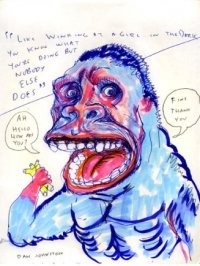 “Will you marry me?” I was going crazy. I loved her more than ever before for every second we were together. It turns out she’d been listening to my music this whole time and I had no idea. She’s the most beautiful girl in the whole world. And I was singing to her in my head this whole time. But she should marry Jesus Christ. I couldn’t take care of her. We’re very good friends though. But I lost her phone number.
“Will you marry me?” I was going crazy. I loved her more than ever before for every second we were together. It turns out she’d been listening to my music this whole time and I had no idea. She’s the most beautiful girl in the whole world. And I was singing to her in my head this whole time. But she should marry Jesus Christ. I couldn’t take care of her. We’re very good friends though. But I lost her phone number.
Phawker: Do you believe in Jesus Christ?
Daniel Johnston: I believe in Jesus Christ, of course.
Phawker: Do you believe in the Devil?
Daniel Johnston: I believe in the devil too much. And that’s the problem. I was really surprised when they named the movie The Devil and Daniel Johnston. I don’t like the association.
 Phawker: Was Gibby Haynes the one who gave you the acid that night?
Phawker: Was Gibby Haynes the one who gave you the acid that night?
Daniel Johnston: We got the acid elsewhere in town earlier in the night. But when the concert started out, he yelled “Satan, Satan, Satan!” and it freaked me out. I never missed his shows. But this time I freaked out. Everyone turned into zombies. And I wound up in the hospital for five years because of it. Back then it was a struggle just to have a cigarette, cause’ I’d have to get it off somebody at the hospital.
Phawker: And how are you now?
Daniel Johnston: I’ve never been better. I’m working on music and drawing and I’m very excited to tour. The fans and crowds have been really great. And what’s cool about going on tour is my brother lets me go to comic book stress and spend hundreds of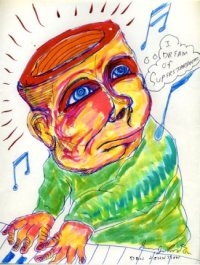 dollars. I can’t read the fine print anymore but I just like comic books for the art. You know, Spiderman, Superman. In our new house we have a whole room filled with stuff like movies, comic books, instruments. My inspiration is stuff like Bela Lugosi, Ghost of Frankenstein, Son of Frankenstein, House of Frankenstein. It really does inspire me. I just hear it, walk across the room, and record what I think of it.
dollars. I can’t read the fine print anymore but I just like comic books for the art. You know, Spiderman, Superman. In our new house we have a whole room filled with stuff like movies, comic books, instruments. My inspiration is stuff like Bela Lugosi, Ghost of Frankenstein, Son of Frankenstein, House of Frankenstein. It really does inspire me. I just hear it, walk across the room, and record what I think of it.
Phawker: What are your favorite non musical sounds?
Daniel Johnston: Late at night there are these yahoos who live on our street and they get on their motor bikes at 9:30 or 10:00. And I’ll hear the grumbling way down the road across the fields. It’s hilarious ’cause it’s so loud. It’s like gggrrrrr (makes loud motorcycle-esque noises). I also like the sound of my dog barking. She died this year. She’d always bark as I’d play my music to tell me what she thought about it. And I miss that sound.
[As told to EVA LIAO]
Daniel Johnston performed at the Trocadero last night with the Capitol Years.
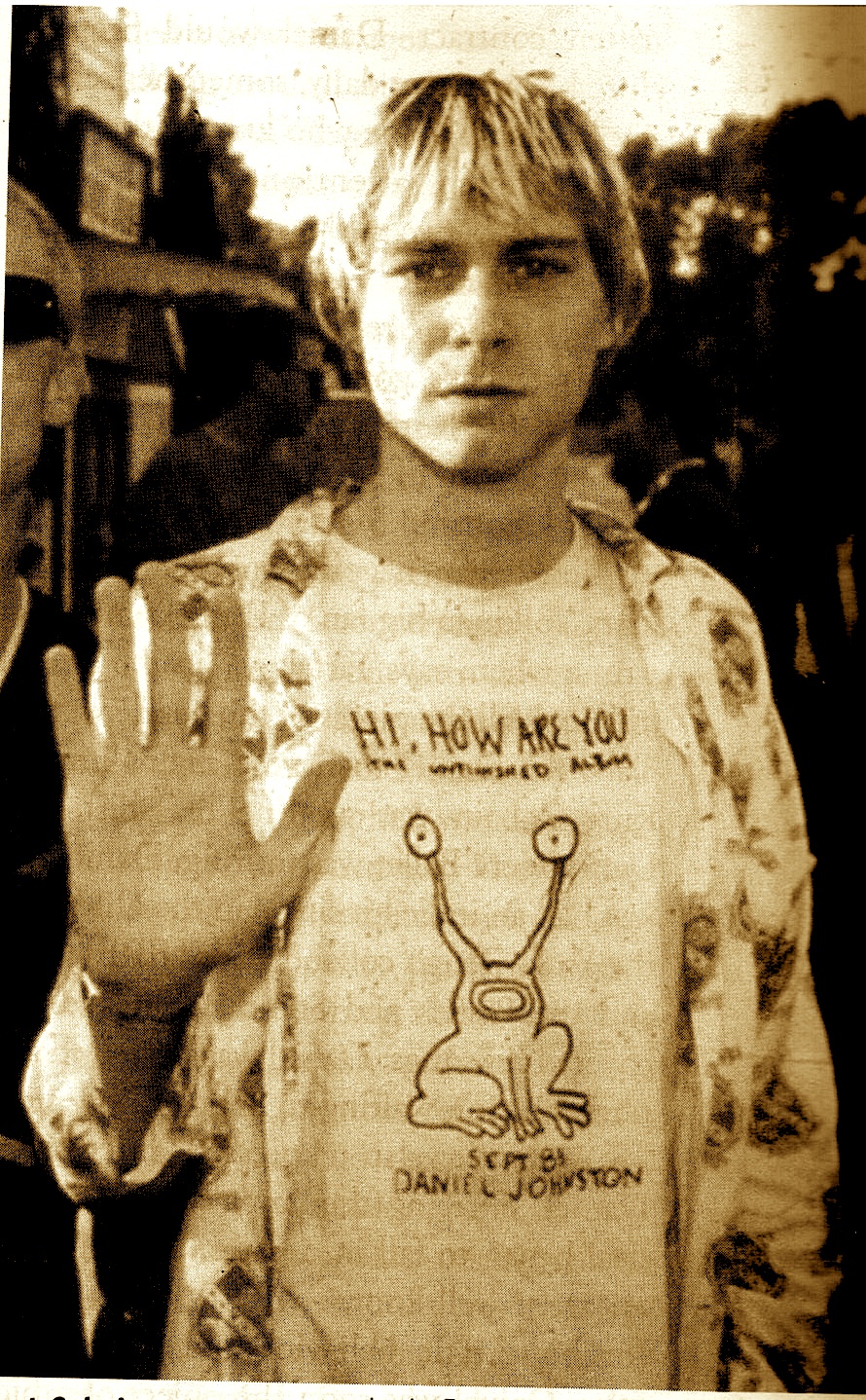
***
BEING THERE: A Star-Studded Interview With I Am Trying To Break Your Heart Director Sam Jones

 BY JONATHAN VALANIA In honor of you-know-who playing the Tower tonight (look for pix tomorrow, and an Inquirer review up Monday) and the Oscars on Sunday, I give you this Q&A with Sam Jones, the director of I Am Trying To Break Your Heart and photographer to the stars. Sam recently called out of the blue to tell me how excited he was about this band he was working with from Chambersburg, PA, called The Shackeltons. I told him I would check out these Shackeltons if he would sit for an interview, because that’s the way show biz works, Sammy. I say that in jest, because Sam knows how show biz works. He recently published The Here And Now (Harper Collins), a collection of his stunning celebrity portraiture, with foreward by George Clooney. Speaking of which, Sam shot Clooney on Monday for this week’s TIME cover story. Small world.
BY JONATHAN VALANIA In honor of you-know-who playing the Tower tonight (look for pix tomorrow, and an Inquirer review up Monday) and the Oscars on Sunday, I give you this Q&A with Sam Jones, the director of I Am Trying To Break Your Heart and photographer to the stars. Sam recently called out of the blue to tell me how excited he was about this band he was working with from Chambersburg, PA, called The Shackeltons. I told him I would check out these Shackeltons if he would sit for an interview, because that’s the way show biz works, Sammy. I say that in jest, because Sam knows how show biz works. He recently published The Here And Now (Harper Collins), a collection of his stunning celebrity portraiture, with foreward by George Clooney. Speaking of which, Sam shot Clooney on Monday for this week’s TIME cover story. Small world.
PHAWKER: So I saw your movie, I Am Trying To Break Your Heart, and I thought it was pretty good. For a first-time director, anyway. To be honest, I thought it was gong to be a little more about me and less about Wilco.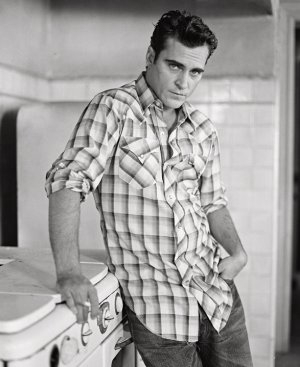 I remember paying you good money to be in that film. Did everyone have to pay? How much did you charge Wilco? It seems like it’s playing all the time on IFC. Seems like everyone I know and run into along the way tells me they have seen it on there.
I remember paying you good money to be in that film. Did everyone have to pay? How much did you charge Wilco? It seems like it’s playing all the time on IFC. Seems like everyone I know and run into along the way tells me they have seen it on there.
SAM JONES: Yeah, it’s kinda taken on a life of its own, it kinda lives in the cultural ether. Obviously that is very gratifying. I am always pleasantly surprised how many people I shoot tell me they are big fans of the movie and the band.
PHAWKER: Names, please.
SAM JONES: Hmmm, George Clooney is a great fan of the documentary, very supportive. It was all Joaquin Phoenix wanted to talk about when I shot him [around the release of Walk The Line].
PHAWKER: I think I have a man crush on George Clooney, and I’m not even gay. He is to movie stars what Sinatra was to saloon singers. My girlfriend is a little jealous. So any other film projects in the works?
 SAM JONES: Well, two actually. One is a screenplay I wrote and hope to direct, and the other is a film version of [David Foster Wallace’s] Infinite Jest, which I am attached to direct.
SAM JONES: Well, two actually. One is a screenplay I wrote and hope to direct, and the other is a film version of [David Foster Wallace’s] Infinite Jest, which I am attached to direct.
PHAWKER: Holy shit! That is awesome. And INSANE.
SAM JONES: I know, I know. But we have a script that everyone likes. We are looking at casting right now. But whether or not it ever gets made is up to the movie gods.
PHAWKER: What about another fly-on-the-wall-for-a-year music documentary?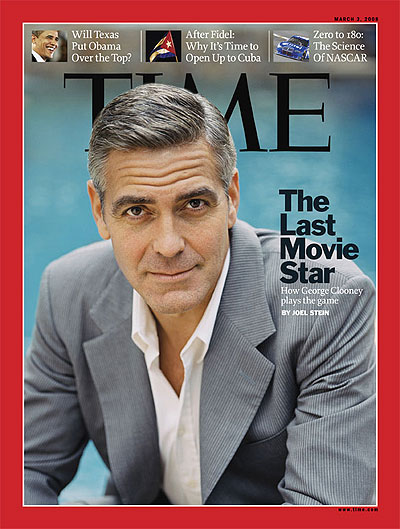
SAM JONES: Definitely, if the right subject comes along, but right now I’ve got an eight-month-old and a 22-month-old to look after.
PHAWKER: So how did this TIME cover come about?
SAM JONES: I think George actually requested me, we get on well, I have shot him many times.
PHAWKER: TIME magazine, that is pretty HUGE, man.
SAM JONES: Actually, I have shot four or five other covers for them: Bono, Tom Cruise, Heather Graham…
PHAWKER: You know, you should think about doing this for a living.
SAM JONES: What was nice about the TIME shoot was that the magazine trusted me enough not to send someone to look over my shoulder the whole time, which is often the case with big shoots. And George is just great. He is not vain. He does not require that a bunch of conditions be met before he agrees to the shoot and he 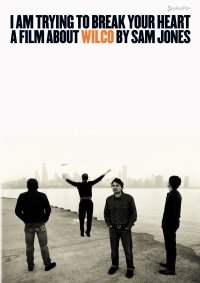 doesn’t take himself too seriously. Great practical joker. [On the TIME shoot] there was no hair or make-up people, no airbrushing. That’s just him as he is. And more power to him for keeping it real. I get annoyed when there is a lot of unnecessary artifice. I have always liked photos that put very little between the camera and the subject.
doesn’t take himself too seriously. Great practical joker. [On the TIME shoot] there was no hair or make-up people, no airbrushing. That’s just him as he is. And more power to him for keeping it real. I get annoyed when there is a lot of unnecessary artifice. I have always liked photos that put very little between the camera and the subject.
PHAWKER: Let’s run through some of the photos in the book. We’ll play word association, I’ll say the subject’s name and you tell me whatever comes to mind about that shoot, OK? Heath Ledger…
SAM JONES: Really nice guy. I caught him at a very happy time in his life. He had just moved to New York with Michelle and they just had a kid. All I remember was he was really into cooking healthy, whole food meals for his family and really into being a new father. He was in what I call ‘new child bliss’.
PHAWKER: Barenaked Ladies?
SAM JONES: It was THEIR idea to get naked. I thought that was pretty cool, first time on the cover of Rolling Stone and these guys wanna get naked. I went into that shoot thinking these guys aren’t my thing, but I walked away really, really liking those guys.
away really, really liking those guys.
PHAWKER: What is the number one priority when you shoot Tom Cruise?
SAM JONES: Be on time, he’s very prompt.
PHAWKER: Do you ever feel intimidated?
SAM JONES: Maybe at the very beginning, but never by my subjects. The problem is always a handler getting in the way, a publicist running interference or the magazine being fussy. To me it is no different than shooting a dentist or a housekeeper: Try to make them comfortable.
PHAWKER: Jack Nicholson.
SAM JONES: Really smart guy, not so worried about social graces or what comes out of his mouth. Tom Cruise likes you to tell him what to do, he likes to be directed. Jack gets bored with that real quick. It’s best not to tell him what to do. I just try to be a fly on the wall and capture some natural moments.
PHAWKER: Matt Damon. Those Bourne movies are the shit!
SAM JONES: Again, great guy. Totally up for anything. We did this Boys Life shoot for Premier, a day that any guy would love: we had a dock, we had mud, we had a raft, we had a train.
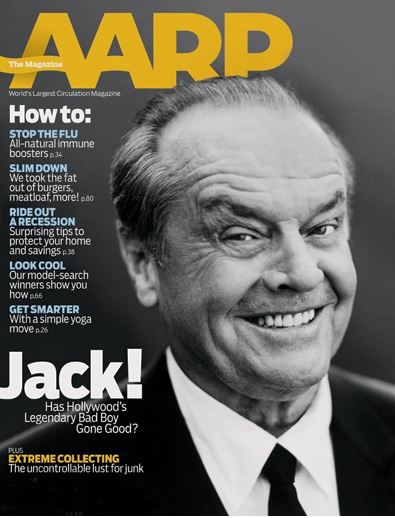 PHAWKER: Wes Anderson and Owen Wilson.
PHAWKER: Wes Anderson and Owen Wilson.
SAM JONES: We shot that in New York for Rolling Stone, the idea was that we were these imaginary French New Wave filmmakers running around the city shooting on the fly with all natural light. They loved it. It’s always so great shooting people that are friends.
PHAWKER: Joaquin Phoenix.
SAM JONES: Another fan of the Wilco movie. When I shot him he had just directed a music video for his friend’s band and he wanted to talk shop.
PHAWKER: And in addition to all of this, you are a partner in a record label called Loveless, which, just let the reader in on the back story is how you and I got back in touch. You called me out of the blue to tell me about this band from Chambersburg, PA, that you were working with called the Shackeltons. Tell me why they are special.
SAM JONES: They are young, full of punkish energy and sound like a band that loves Television even though they never actually heard Television, if that makes sense. Very rudimentary, with these incredible moments of accidental brilliance.
PHAKWER: One last question, tell me something scandalous about Renee Zellweger.
SAM JONES: She is John Cougar Mellencamp’s biggest fan.
***
HIGH ROLLER: Q&A With Mob-Rocker Michael Imperioli, AKA Chris-tuh-fuh From The Sopranos
 BY AMY Z. QUINN Life is, in fact, pretty sweet right now for Michael Imperioli. He’s the darkly handsome 41-year-old New York actor best known for playing Italian-American guys who meet untimely-yet-unsurprising ends, like that stutterin’ prick Spider from Goodfellas and everybody’s favorite cousin, Chrissy Moltisanti, on The Sopranos. As an actor, Imperioli has done stage work, TV (everything from Mitch Albom’s For One More Day to “The Simpsons” to “Law & Order”) and movies (including one of my own favorites, Household Saints).
BY AMY Z. QUINN Life is, in fact, pretty sweet right now for Michael Imperioli. He’s the darkly handsome 41-year-old New York actor best known for playing Italian-American guys who meet untimely-yet-unsurprising ends, like that stutterin’ prick Spider from Goodfellas and everybody’s favorite cousin, Chrissy Moltisanti, on The Sopranos. As an actor, Imperioli has done stage work, TV (everything from Mitch Albom’s For One More Day to “The Simpsons” to “Law & Order”) and movies (including one of my own favorites, Household Saints).
He and his wife, Victoria, have two kids; the couple are co-artistic directors of Studio Dante, a New York jewel box theater spotlighting new and progressive productions, and Imperioli has writing credits to his name. All that ought to be enough to satisfy even the greediest creative appetite, but this week Imperioli will come to Philly fronting La Dolce Vita, a rock three-piece he put together in 2006 with drummer Olmo Tighe and bassist Elijah Amitin.
Imperioli told me he’d been playing the guitar for years and had done some time in downtown rock bands back in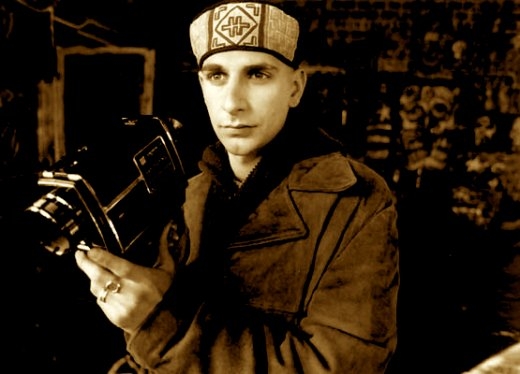 the late ’80s and early ’90s, and hooked up with his new — and younger — bandmates through actor Olmo’s brother, actor Michael Tighe. Imperioli and Tighe had acted together in the movie Postcards From America, back when Olmo was a kid.
the late ’80s and early ’90s, and hooked up with his new — and younger — bandmates through actor Olmo’s brother, actor Michael Tighe. Imperioli and Tighe had acted together in the movie Postcards From America, back when Olmo was a kid.
“We had this initial batch of songs I’d written, some of them like 20 years ago, and never really recorded or performed,” he said, and they’ve written more together. An EP is in the works. “Even though they’re much younger, they have really expansive musical knowledge.”
I ask him how fronting a band compares to acting — is he playing another character up there, or is this just Mike and his guitar?
“Well, it doesn’t feel like a character, but it is a very emotional art form that does have things that are similar, particularly to stage acting,” he says. “You have your lines, which can be your guitar parts and your vocal, and then you rehearse and you practice, but then you have to get up on stage and kind of let it go, and reach out to an audience and let them experience it.”
I tell him I keep reading how their sound has some kind of Patti Smith vs. The Pixies thing happening, what’s that all about?
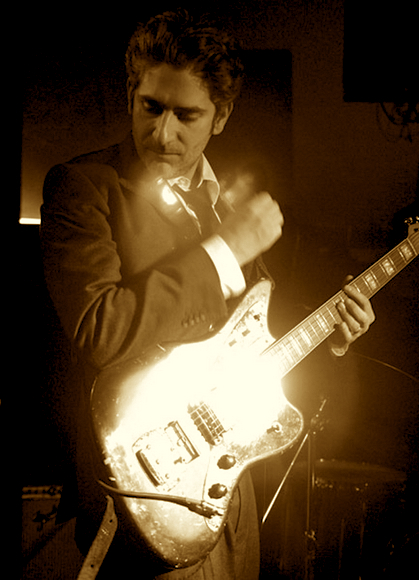 “Whether or not we sound like that is a different story, but I will say it’s a very kind of New York vibe, since we’re all native New Yorkers,” he says, but with influences not just from Patti from Jersey, but post-punk outfits like the Smiths, Pixies and Nirvana.
“Whether or not we sound like that is a different story, but I will say it’s a very kind of New York vibe, since we’re all native New Yorkers,” he says, but with influences not just from Patti from Jersey, but post-punk outfits like the Smiths, Pixies and Nirvana.
The Silk City gig is the band’s first in Philly, but Imperioli said he’d spent some time out in Wayne shooting Peter Jackson’s version of The Lovely Bones, in which he plays the police detective who doggedly investigates a murder (and uh, intimately investigates the victim’s mother). I tell him it’s a shame he hasn’t spent more time here in the bosom of so many paisans who’d eat him up like pannacotta, and we laugh wondering what an “Italo-hipster” (thank you, Don Amorosi ) might be. Hairy guys with a Stella in one hand and a sfogliatelle in the other? Imperioli laughs. “I don’t know, maybe a bunch of guys who look like Christopher Moltisanti, rocking out? I guess we’ll see!”
Eventually, as I presume every interview with him does at some point, ours comes around to The Sopranos Question. He’s cool about it. One interview I’d read had him quoted saying he loved the series’ ending, but beyond that, what does he think happened to Tony at the end of that last episode, “Made In America”?
“At first I thought that there is no happening, that it is just the ending,” he says. “Like, at first I thought that David Chase is saying that Tony has to live his life with a lot of uncertainty and death around every corner, not unlike how we have to live in the post 9-11 world. That in the midst of uncertainty, that you keep what’s most important close to you. But then, I kept hearing David Chase talk about clues, and then I wasn’t sure.”
Chase has said that while there are no “esoteric clues” in the final episode — meaning, the onion rings were probably just onion rings and none of the other diner patrons were previously killed-off minor characters or whatever other craziness the Internet comes up with — all the evidence you need to decide what happened is right there. Though that doesn’t tell us whether the dude in the Members Only jacket came out of the can with a gun.
At this point I remind Imperioli that he worked for Chase for what, almost a decade, and of all people he ought to be able to call a brother up and ask him what’s what. Again, he cracks up. “I don’t think he’d tell me!”
***
Q&A: It’s Too Late To Fall In Love With Sharon Tate
 BY JONATHAN VALANIA Meet Roza Frykowska, 26, a recent emigre from Lodz, Poland. She is a barista at Cafe Ole in Old City. She is also an up and coming photographer, and recently started shooting for Suicide Girls. All of that would make her interview-worthy in and of itself in our book, but wait, it gets better, or worse, actually. Roza’s grandfather, the filmmaker Wojtech Frykowski, came to America in the late 60’s to establish a career in Hollywood, at the behest of his dear friend, Roman Polanski. Wojtech and his then-girlfriend, Abigail Folger, heiress to the Folger coffee fortune, were frequent guests at the Cielo Drive home of Roman Polanski and his very pregnant wife, the actress Sharon Tate. In fact, they were, tragically enough, guests at Cielo Drive the night the Manson Family showed up. The police would find their butchered corpses on the front lawn the next morning. The Frykowska family would employ a series of lawyers for the next 39 years to ensure that none of the convicted ever got paroled or gained financially from their monstrous crimes. This is why Guns N’ Roses had to remove their cover version of Manson’s “Look At Your Game, Girl” from The Spaghetti Incident back in 1993. The tragedy of the Manson murders has cast a long shadow over the Frykowska family, so you can imagine how it gave them pause when Roza, as a teenager, became an avowed Marilyn Manson fan. But wait, that’s only the half of it. Her father, also a high-profile Polish filmmaker, was murdered under eerily similar circumstances…
BY JONATHAN VALANIA Meet Roza Frykowska, 26, a recent emigre from Lodz, Poland. She is a barista at Cafe Ole in Old City. She is also an up and coming photographer, and recently started shooting for Suicide Girls. All of that would make her interview-worthy in and of itself in our book, but wait, it gets better, or worse, actually. Roza’s grandfather, the filmmaker Wojtech Frykowski, came to America in the late 60’s to establish a career in Hollywood, at the behest of his dear friend, Roman Polanski. Wojtech and his then-girlfriend, Abigail Folger, heiress to the Folger coffee fortune, were frequent guests at the Cielo Drive home of Roman Polanski and his very pregnant wife, the actress Sharon Tate. In fact, they were, tragically enough, guests at Cielo Drive the night the Manson Family showed up. The police would find their butchered corpses on the front lawn the next morning. The Frykowska family would employ a series of lawyers for the next 39 years to ensure that none of the convicted ever got paroled or gained financially from their monstrous crimes. This is why Guns N’ Roses had to remove their cover version of Manson’s “Look At Your Game, Girl” from The Spaghetti Incident back in 1993. The tragedy of the Manson murders has cast a long shadow over the Frykowska family, so you can imagine how it gave them pause when Roza, as a teenager, became an avowed Marilyn Manson fan. But wait, that’s only the half of it. Her father, also a high-profile Polish filmmaker, was murdered under eerily similar circumstances…
PHAWKER: So just to bring the reader up to speed, let me recount how this ball got rolling. I was buying a cup of coffee at Cafe Ole, and you were working the cash register. I asked you about your accent.
ROZA: And I said I was from Poland.
PHAWKER: You then mentioned that your family were all filmmakers, and I jokingly said ‘Is your last name Polanski?’ And then you pointed out that your father was best friends with Roman Polanski and was staying at his house on Cielo Drive in Los Angeles the night the Manson Family showed up.
ROZA: And then you asked if you could interview me.
PHAWKER: And here we are. So, how long have you lived in America?
ROZA: Six years. Basically I was offered a photography apprenticeship in Cape May, shooting commercial stuff, wedding photos, family portraits.
PHAWKER: So I was looking up your family on Wikipedia, were you the daughter that went on the Polish version of Big Brother?
ROZA: No, that was my half-sister. You see, everyone in my family is a photographer or a filmmaker and she felt really left out. That is why she was pushing so hard for a career as an actress and that’s why she went on Big Brother.
PHAWKER: And how did that go?
ROZA: It was very stressful for my family because she wound up having sex and in the Polish version they don’t censor anything. So she basically had sex on national television.
PHAWKER: Wow, what a country!
ROZA: Actually, it’s a very superstitious place. There are a lot of people that think there is a curse on my family. You see, not only was my grandfather stabbed to death, but years later, so was my father. By his girlfriend at the time, who was the daughter of a very famous Polish film director, but also very insane. She had a history of stabbing boyfriends that tried to break up with her. And then my great grandfather was a race car driver and he died in a car accident. On our family tombstone there is a big list of people and they all say ‘Died Tragically.’
PHAWKER: Do you believe in curses?
ROZA: No, I believe in fucked up coincidence.
PHAWKER: Amen, sister. ROZA: And I believe in victim’s rights. My family has kept lawyers on retainer for the last 39 years just to make sure that none of the Manson Family gets paroled. And we also make sure that they don’t make money off the crime. That is why Guns N’ Roses had to remove [”Look At Your Game, Girl”] from The Spaghetti Incident. The only way to get it now is on Ebay…But then, when I was a teenager, I was a huge fan of Marilyn Manson.
ROZA: And I believe in victim’s rights. My family has kept lawyers on retainer for the last 39 years just to make sure that none of the Manson Family gets paroled. And we also make sure that they don’t make money off the crime. That is why Guns N’ Roses had to remove [”Look At Your Game, Girl”] from The Spaghetti Incident. The only way to get it now is on Ebay…But then, when I was a teenager, I was a huge fan of Marilyn Manson.
PHAWKER: I bet that didn’t go over with the family.
ROZA: No, no. They are anti-anything that has to do with Manson, for obvious reasons, but I really thought Marilyn Manson was very creative artist.
PHAWKER: Agreed. He is a clever man. Plus he used to bone Rose McGowan.
PHAWKER: So you were telling me you started to shoot for Suicide Girls, what’s it take to get that gig?
ROZA: Five good ass shots! I am serious, that is what they tell you. ‘Bring us five good ass shots.’ So now every time I shoot, it’s like ‘turn around, lemme see your ass!’ Haha.
PHAWKER: Hahahaha. Me too!
ROZA: Hahahaha.
[DEATH VALLEY ‘69, illustrations by ALEX FINE]
***
Q&A: Let’s Talk About Sex, Baby
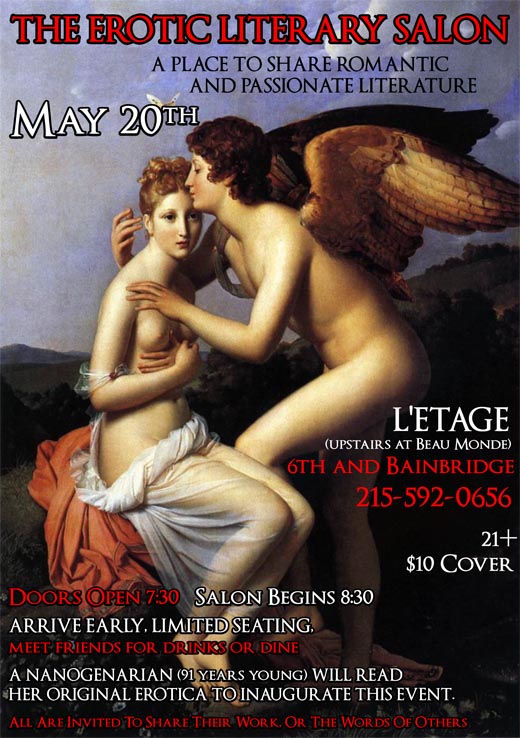
As promised, sexy time Q&A with sexologist Susana Mayer, host of the Erotic Literary Salon.
PHAWKER: So, just to bring the reader up to speed: Your name is Susana Mayer, you are 60-years-young, you live here in Philadelphia, you are the creator and host of The Erotic Literary Salon and you are a sexologist. What exactly is a sexologist?
SUSANA MAYER: It is the study of how we give and receive pleasure.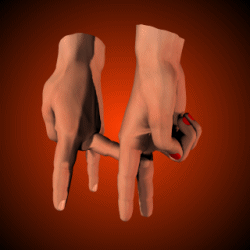
PHAWKER: And you were telling me that you are working on your doctoral dissertation…
SUSANA MAYER: Yes. The working title is, In Pursuit Of Sexual Pleasure Reframing Obsolagnium: What Is the Relationship Between Post-Menopausal Libidinal Status and Viewing Explicit Sex Videos?
PHAWKER: What does ‘obsolagnium’ mean?
SUSANA MAYER: The waning of sexual desire with age. The libido can be divided into two parts: instinctual drive and the response drive. The instinctual drive is sort of a self-preservation impulse to procreate early and often. This changes as we age. The emphasis shifts to response drive — response to stimuli that activates sexual desire — which, unlike the instinctual drive, remains strong throughout our lives. However, in the absence of stimuli, it tends to hibernate or go dormant. I get a lot of people, mostly women, telling me “I just don’t have the desire (for sex) like I used to.” What I tell them is, “You still have the desire, you just don’t know how to activate it.” And for a lot of women of a certain age, this means experimenting with new things. Like viewing pornography, or experimenting with BDSM or anal sex.
PHAWKER: Do you think women can enjoy pornography as much as men?
SUSANA MAYER: Barring certain blatantly degrading content, the real issue has always been access. Before the Internet, you had to venture into some sleazy backroom to get it, and women simply were not going to go there.  But now you can access it from the comfort, safety and relative anonymity of the Internet and I think that is bringing about a significant change in attitudes about pornography amongst men and women.
But now you can access it from the comfort, safety and relative anonymity of the Internet and I think that is bringing about a significant change in attitudes about pornography amongst men and women.
PHAWKER: Is it just me or has anal sex become mainstreamed? Obviously its been around since the beginning of human sexuality, but it seems to have shed some of its shamefulness, much the same way masturbation has.
SUSANA MAYER: Without a doubt. Once you get past the squeamishness and bathroom associations of that part of the body, [anal sex] has become a viable alternative for older women that find vaginal sex too painful. And then on the other end of the age spectrum, you have all these young people who consider everything up to vaginal intercourse to be maintaining their virginity. Likewise you have the Internet delivering all these diverse sexual realities to your doorstep, and at the same time there has been a number of very useful books explaining how women can derive great pleasure from anal sex — the anus is one of the largest clusters of nerve endings in the human body — and dispelling old myths that anal sex is by definition painful. If it hurts, you are doing it wrong.
PHAWKER: What about this phenomenon of teachers and students engaging in sexual relationships. Is this becoming more common, even epidemic, or do we just hear about it more because of the pervasiveness of the media in our lives?
SUSANA MAYER: This is definitely not a new thing. Although it is difficult to quantify it, I would venture that it is no more or less common today than when I was a schoolgirl. We just hear about it more because it is no longer being swept under the rug. You know, when I was growing up the word ’sex’ was NEVER spoken in my household. I had one talk with my mother and it was literally about the birds and bees. I think we saw one instructional film in school that was sponsored by Kotex or Tampax, and it was utterly biological and beyond boring.
 PHAWKER: People tend to say America is prudish and puritanical compared to, say, Europe. But how do you reconcile that with the fact that Americans are bombarded with sexual messages from the minute they wake up until they go to bed. I would submit that there is a very vocal prudish minority in this country warning of impending Sodom & Gomorrah, but the majority of Americans are just sorta like “…hmm, that’s hot!”
PHAWKER: People tend to say America is prudish and puritanical compared to, say, Europe. But how do you reconcile that with the fact that Americans are bombarded with sexual messages from the minute they wake up until they go to bed. I would submit that there is a very vocal prudish minority in this country warning of impending Sodom & Gomorrah, but the majority of Americans are just sorta like “…hmm, that’s hot!”
SUSANA MAYER: Well, I would agree. But at the same time there is a disconnect between all these sexual messages we are bombarded with on a daily basis and what happens in the marital bedroom. I do a lot of work with women’s groups and it amazes me how many married people are NOT having sex.
PHAWKER: Tragic. What impact do you think Viagra and the like have had on human sexuality?
SUSANA MAYER: Well, the one part of the Viagra phenomenon that doesn’t get a lot of media play is that drug companies own studies show that only 50% of men prescribed Viagra got the prescription re-filled. Now, why is that? One reason is that that the pills didn’t work. They facilitate the flow of blood to the penis, but they don’t create sexual desire where none existed before. And if you are not aroused by your wife or partner in the first place, the pills don’t work.
PHAWKER: What about the phenomenon of the median age for puberty becoming younger and younger?
SUSANA MAYER: I was just having this conversation with some of my girlfriends, and we were all saying how we have never seen so many young girls with big boobs — and I am not talking about implants. When I was in school, there was only one or two girls with big boobs and now the reverse seems to be true. Obviously it has to do with heightened levels of estrogen in the food chain, cattle being fed hormones, etc. And the reality is nobody knows where this is heading. Very little is actually known about hormones and there are only a couple books on the topic that are worth reading.
have never seen so many young girls with big boobs — and I am not talking about implants. When I was in school, there was only one or two girls with big boobs and now the reverse seems to be true. Obviously it has to do with heightened levels of estrogen in the food chain, cattle being fed hormones, etc. And the reality is nobody knows where this is heading. Very little is actually known about hormones and there are only a couple books on the topic that are worth reading.
PHAWKER: What prompted you to start the Erotic Literary Salon?
SUSANA MAYER: Well, many reasons. But the biggest one was that there wasn’t one in this city.
PHAWKER: Last question, I have always wondered about this, and if anyone would know the answer it’s a sexologist: At any given moment on planet Earth, how many people are having sex? It must be a fairly astronomical number — it’s like there’s this massive, planet-wide mosaic of sex, or a global orgy that’s broken off into small discussion groups of ones and twos and threes.
SUSANA MAYER: I am sure somebody has that answer, Honey, but it’s not me. The only way to get a grasp on that kind of figure would be through surveys, and the sad reality of sex surveys is that people are probably not going to tell you the truth. Before I moved here, during a visit to town, I conducted a sex survey with some women in and around Rittenhouse Square. And then years later when I moved here, I befriended some of these same women and as they began to open up to me about their sex lives — as a friend, not a clinician taking a survey — I realized how, um, less than truthful their answers to my survey questions actually were. It wasn’t three partners, it  was 10!
was 10!
PHAWKER: So doesn’t that call into question the validity of every scientific sex study based on surveys?
SUSANA MAYER: Right, we really don’t know.
***
TONGUE IN CHIC: Q&A With Nico Muhly

![]() BY DAVE ALLEN Nico Muhly is a thoroughly modern composer. His pieces are larded with innately contemporary textures, wherein classical elements – harpsichord, violin, celesta – bump up against vocalists rapidly-intoning lists over the sound of scraping knives and burbling synthesizers. In just a few short years, he’s earned just as much cred in the pop music world (collaborations with Antony and the Johnsons, Bonnie “Prince” Billy, and Bjork) as he has in the hallowed halls of classical (commissions from the Boston Pops, Chicago Symphony, and NYC avant-garde venue The Kitchen) while maintaining an astonishing level of productivity. He’s already had a Carnegie Hall retrospective concert of his work, for goodness’ sake. His current tour with Sam Amidon and Thomas Bartlett AKA Doveman, which stops at the First Unitarian Church tonight, might seem strange, but the trio all have roots in Vermont, all now call NYC home, and all three have collaborated on performances and productions for years. They’ll be performing in a kind of round-robin, with each musician taking a turn in the spotlight with the other two playing back up. Muhly talked with us about moving his works from studio to stage and on the chemistry he’s developed with his tour-mates.
BY DAVE ALLEN Nico Muhly is a thoroughly modern composer. His pieces are larded with innately contemporary textures, wherein classical elements – harpsichord, violin, celesta – bump up against vocalists rapidly-intoning lists over the sound of scraping knives and burbling synthesizers. In just a few short years, he’s earned just as much cred in the pop music world (collaborations with Antony and the Johnsons, Bonnie “Prince” Billy, and Bjork) as he has in the hallowed halls of classical (commissions from the Boston Pops, Chicago Symphony, and NYC avant-garde venue The Kitchen) while maintaining an astonishing level of productivity. He’s already had a Carnegie Hall retrospective concert of his work, for goodness’ sake. His current tour with Sam Amidon and Thomas Bartlett AKA Doveman, which stops at the First Unitarian Church tonight, might seem strange, but the trio all have roots in Vermont, all now call NYC home, and all three have collaborated on performances and productions for years. They’ll be performing in a kind of round-robin, with each musician taking a turn in the spotlight with the other two playing back up. Muhly talked with us about moving his works from studio to stage and on the chemistry he’s developed with his tour-mates.
PHAWKER: With the kind of programming and sampling and microphone placement that goes into studio work, it seems that there’s not a lot left to chance in recording an album. To what extent do you have to give up control when playing your compositions live? Also, to what extent are the compositions from Speaks Volumes and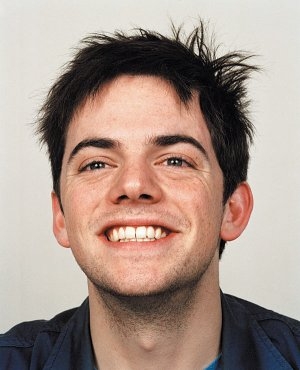 Mothertongue the basis for live performances? How concerned are you with replicating everything as it appears on the recordings?
Mothertongue the basis for live performances? How concerned are you with replicating everything as it appears on the recordings?
NICO: Performing this material live is just about figuring out what-all needs to be directly ripped from the album (the idea of close mic-ing, for instance) and other things that we don’t need to replicate (certain sound effects that are best heard on a speaker, or headphone). Basically, if you have good performances (Musicianship!), you don’t need to make such a big deal about replicating the little sonic minutiae of the recording live. Also: I’m very used to giving up control of my music because I normally don’t perform it at all. I just sit there and smash my hands together nervously.
PHAWKER: I know you’ve used Icelandic language in your music, and it almost seems like you turn English into a foreign language on Mothertongue. When will we see some Arabic and Chinese settings? How will you decide when you’re ready to use an element like that?
NICO: Ha! I don’t know about any of that. For a while I was thinking about using Arabic noun forms (there are ten) which are very specifically rhythmic. I don’t have any relationship with the Chinese language, though, and it kind of freaks me out. I like that you think I “foreigned” English, that was sort of my intent.
PHAWKER: On this tour, you’re playing with long-time friends and collaborators. As a composer, you often have to swoop in from somewhere for a few days of frenzied work with people you may not have met before and may never meet again. How would you describe the difference between these two working and music-making situations? And though I know it might not be a matter of preferring one over the other, what’s your ideal setting?
NICO: As you predicted, I like both. Having people who don’t know anything about me or my music playing something for the first time has a certain urgency, like, the flash of excitement of seeing something for the first time. It’s like a cold shower. Working with longtime collaborators is sort of like a hot bath – way more relaxing. Specifically, Nadia Sirota, the violist, and I have worked together for so long that I can just sit back and watch her work, rather than fret anxiously.
PHAWKER: How do the demands of playing Sam and Thomas’ music compare with the instruments and sample you have to tackle in presenting your own music? What do you feel you have musically in common with the two of them?
NICO: Thomas and I have a lot of things in common as we relate to other people’s music – the way to space a chord, the use of pulse or not, etc., and Thomas produced and arranged all of Sam’s first album, and I arranged the second, so there is a natural crossover there. Also, I am a huge fan of Sam’s music anyway, so it’s a treat to get to play it.
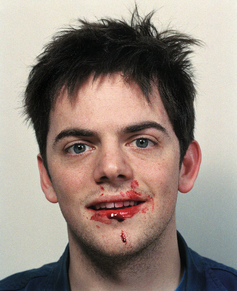 PHAWKER: On this tour, how have audiences reacted? Has there been the kind of deadly silence and uncertainty about when to clap that characterizes most concert-hall music, or has the audience been looser and more adaptive? As a result, how loose have you, Sam, Thomas, and the other performers felt?
PHAWKER: On this tour, how have audiences reacted? Has there been the kind of deadly silence and uncertainty about when to clap that characterizes most concert-hall music, or has the audience been looser and more adaptive? As a result, how loose have you, Sam, Thomas, and the other performers felt?
NICO: No, it’s been fine! People clap whenever they like. That’s, like, the last way to judge whether or not the show was good. You can just usually “tell.”
PHAWKER: How would you describe an ideal live performance of your work? How does that differ from an ideal recording of it? Aside from trying to play all the right notes, what has to happen in each one for a satisfying result?
NICO: As long as the performers feel like they are communicating simultaneously what I wrote and also their own agenda as musicians, I’m going to be happy. I like when a piece of mine becomes a way for a performer to, you know, perform. Ideally also I am surrounded by friends and loved ones, but that’s even more ideal.
PHAWKER: In the New Yorker profile of you from February, you said, “More people have met me than have heard what I do, and I am working to change that.” Is this tour — including the types of venues that you’re playing – a part of that effort?
NICO: It’s not really an effort – I wish I could say that I were more Machiavellian about my life. This tour is really an excuse to do something that I probably won’t have time to do again for a while.
He’s not kidding about not having the time for tours. An upcoming commission from the Metropolitan Opera – Muhly has described the project as a “teen gay Internet sex drama” (seriously) – is sure to launch him to even more stratospheric heights, so catch him if you while you can.
***
Q&A: David Berman of The Silver Jews
BY ED KING Since founding Silver Jews with with college friends Stephen Malkmus and Bob Nastanovich, songwriter/poet/cartoonist David Berman has rolled stoned, gathered a little moss along with a rotating cast of indie-rock contributors, hit rock bottom, toured the Promised Land, saw the light, and built an accomplished body of earthy, intelligent work. Over the years, as the band’s recordings moved from lo-fi to a matte finish country rock, Berman’s deep, wry, downbeat delivery remained a constant. In 2006, after years of not touring and surviving the lowest point in his personal life, Berman took Silver Jews, including his wife Cassie on bass, on the road for the first time. The tour would take the band as far as Israel. June saw the release of Lookout Mountain, Lookout Sea (Drag City), the title of which refers in part to Berman’s restored eyesight following a cornea transplant. In the liner notes Berman supplies tablature so we can play along with the album and, if we’re not already hip to it, realize that the music is ours, not some complex mystery.
PHAWKER: What are five songs that might ease the suffering of your local jukebox?
DAVID BERMAN: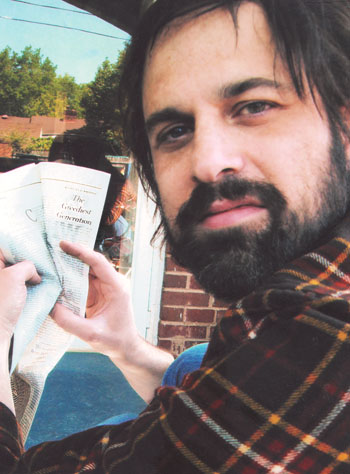
“Long Hot Summer” – The Style Council
“A Few Things Different” – Kenny Chesney (trust me on this one)
“Borrowed Angel” – Mel Street
“Rainy Day Woman” – Waylon Jennings
“Moments in Love” – Art of Noise
PHAWKER: You’ve worked with a shifting cast of musicians. Do you have your next set of recording musicians in mind while writing? How much do you expect the musicians to execute your visions for a song vs how much you expect them to shape the song?
DAVID BERMAN: Some songs find me specifically coaching, but in those 5 to 10 days of practicing the songs in a circle, the band even criticizes itself or I’ll ask them what they think if x does y. There is some negotiation among the players and then there is the amount of figurative talk I’m feeding them about the song. I’ll try to explain the setting and mood with comparisons or correlations in the leadup to the first practices or as we go along. Until the basic tracks are down nothing is finalized, and so I never have to be stuck with a player’s part I don’t like. Not to mention they are all very smart and fluid, and one way or another “get me”, so a lot of this just happens silently and invisibly.
PHAWKER: You include the chord progressions for the songs on your new album, Lookout Mountain, Lookout Sea. What secrets will be unlocked when I start playing along with the album?
DAVID BERMAN: Well for someone who has never taken a minute to look at how tablature works, it might unlock the secret to playing a guitar, or even writing on a guitar. To those who already know how to play I hope it will show them the option to not get lost in the pursuit of technique when simplicity will do.
PHAWKER: You’re also a published poet – and not, I assume, owing to your fantastic level of celebrity, like Jewel. Is there ever a time when you need to decide whether the words you’re writing should appear as a poem or a song lyric, or is that determined from the start? Do the ideas from a given point in your work flow over to both media?
DAVID BERMAN: The flowcharts of these things always start with me sitting down with the intention to write a poem or a song. There is no poetic idea, no matter how strong, that could cause me to sit down and write a poem in a season in my life where im ostensibly writing songs. I haven’t had a season for poetry in a long time.
 PHAWKER: You did some time in academia when you were younger. If you were to go back to that world and develop a curriculum for examining the poetry of rock lyrics, what would be the first examples included and what would you ensure was excluded?
PHAWKER: You did some time in academia when you were younger. If you were to go back to that world and develop a curriculum for examining the poetry of rock lyrics, what would be the first examples included and what would you ensure was excluded?
DAVID BERMAN: Chuck Berry immediately comes to mind. He was by far the tallest of the forefathers of rock and roll. I would imagine his skills threatened songwriters in Nashville, like Elvis’s was threatening its singers.
PHAWKER: It’s only been the last few years that you’ve toured. Have you noticed any changes in your songwriting as a result?
DAVID BERMAN: It’s probably more oracular or rhetorical.
PHAWKER: Your entry into the world of more regular touring followed struggles with some serious health and addiction problems, right? For some musicians, touring can be a challenge to recovery. Did you find it more difficult to stay healthy on the road, or did getting away from your everyday world actually help?
DAVID BERMAN: It helped. With Cassie I have a bubble inside the bubble that is a band on tour, so I don’t try to interact with vice at all. Also talking with wasted people after the shows, you see how you used to be, and it shames you. That’s a good thing.
PHAWKER: How does Judaism and Jewish-American identity play into your music today? The identity part was there from the beginning. Did your tour of Isreal add anything to your sense of self as a musician?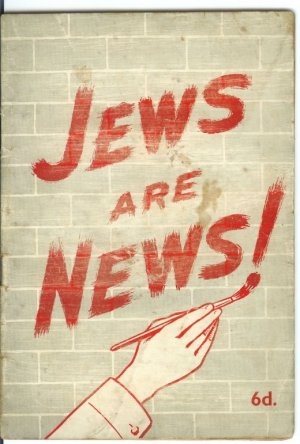
DAVID BERMAN: These are questions I’m also seeking an answer for, so asking me won’t do you any good.
PHAWKER: After years of being misidentified as a “Pavement offshoot” and, despite the probably annoyance I can imagine that sometimes caused, having fans led to your music thanks to the tie-in, do you ever hear of people being directed to Malkmus’ solo albums through your own records? The further he moves away from Pavement the more I hear him occupying your turf.
DAVID BERMAN: He has that elder statesman status that can both “a blessing and a hearse.” I better Google that to see if it’s original. It could be a good metal song… [Berman Googles this possible heavy metal song title.] Damn. It’s pure for Google Books but a web search pulls up the early bird who got there first:
Results 1 – 1 of 1 for ” blessing and a hearse”. (0.25 seconds)
IRON HEARSE – “Iron Hearse”, 2007 reissue (Psychedoomelic); A blessing and a hearse. The first song on IRON HEARSE’s “Rocktopus” is about. . . a Rocktopus, …
www.peacedogman.com/reviews/030108ih.htm – 13k – Cached – Similar pages – Note this
PHAWKER: What’s your take on Charlie Rich’s “Silver Fox” hits of the ’70s? Do they in any way influence your own take on country music?
SILVER JEWS: Punks In The Beerlight
DAVID BERMAN: How much do I love that stuff? Like other bands love the Beach Boys, I love Charlie Rich in the ’70s.
PHAWKER: Charlton Heston or James Franciscus?
DAVID BERMAN: It’s so hard to tell the players in ’70s movies apart, what with all that lens flare and facial hair growing on… [Presumably, Berman Googles a phrase in hopes of clarifying the question.]
No results found for “lens flair and facial hair.”
Ah, now I feel better. Thanks a lot. I enjoyed it.
***
Q&A: The Magnetic Fields’ Stephin Merritt
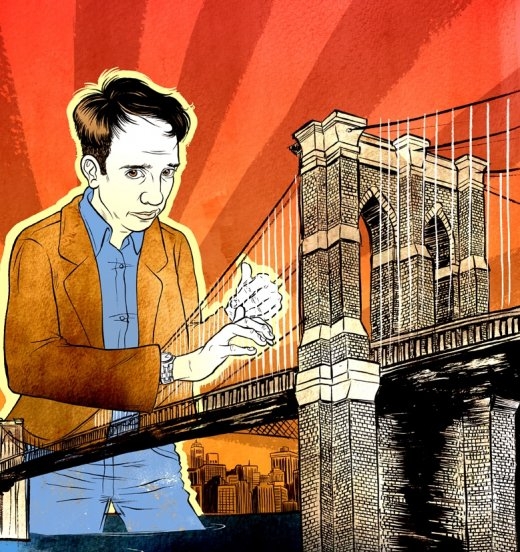
[Illustration by ALEX FINE]
 BY JONATHAN VALANIA If there’s anything missing from Stephin Merritt’s encyclopedic oeuvre — a kitchen-sink catchall that includes everything from wry country twang and sincere synth pop to tortured torch songs and prancing show tunes — it’s Stephin Merritt. A remarkably dexterous stylistic quick-change artist — for my next trick, ladies and gentlemen, I’ll pull the Human League out of Cole Porter’s top hat — he’s a master illustrator of character sketches, meticulously cross-hatching two-minute melodramas out of the delicacies and detritus of 20th-century popular song.
BY JONATHAN VALANIA If there’s anything missing from Stephin Merritt’s encyclopedic oeuvre — a kitchen-sink catchall that includes everything from wry country twang and sincere synth pop to tortured torch songs and prancing show tunes — it’s Stephin Merritt. A remarkably dexterous stylistic quick-change artist — for my next trick, ladies and gentlemen, I’ll pull the Human League out of Cole Porter’s top hat — he’s a master illustrator of character sketches, meticulously cross-hatching two-minute melodramas out of the delicacies and detritus of 20th-century popular song.
But for all their rapier-like wit and chameleonic genre-hopping, Merritt’s songs — spread over releases by his various band guises, including the Magnetic Fields, the 6ths, Future Bible Heroes and the Gothic Archies — always seemed to be delivered with a thespian’s flourish from a theatrical remove. As Jon Lovitz used to say with his index finger thrust skyward: That’s act-ing!
Back in 1998 he sat for a year in some Lower East Side gay dive where the jukebox was always raining men, armed with only a glass of brandy and a pack of American Spirits, his beloved Chihuahua Irving on his lap, feverishly scratching out the stylized Tin Pan drollery of 69 Love Songs. (Has the knife-in-the-heart of unrequited love ever been more cruelly twisted than with the line, “The night you can’t remember, the night I can’t forget”?) There was a song for everybody on that much-lauded opus — “genius,” declared The New York Times – everybody, it would seem, except for always-a-bridesmaid Stephin Merritt.
scratching out the stylized Tin Pan drollery of 69 Love Songs. (Has the knife-in-the-heart of unrequited love ever been more cruelly twisted than with the line, “The night you can’t remember, the night I can’t forget”?) There was a song for everybody on that much-lauded opus — “genius,” declared The New York Times – everybody, it would seem, except for always-a-bridesmaid Stephin Merritt.
In the nine years that have passed since 69 Love Songs topped just about every critic’s best-of list and went on to move more units that the entire Magnetic Fields back catalog combined, Merritt has scored two operas (The Orphan of Zhao and Peach Blossom Fan, which opened last week in Los Angeles), released a Future Bible Heroes album, and created a song cycle based on the wildly popular Lemony Snicket children’s book series, and contributed entries to a new Oxford thesaurus.
In 2004, Merritt finally found time for himself — or more accurately, the first person — with i (deliberately titled in the diminutive e.e. cummings lowercase), which features 14 songs that all start with the ninth letter of the alphabet and end with a sideways glance in the mirror. Distortion, released earlier this year as the second part of a self-styled no-synth trilogy, finally resolves the ancient Zen koan: What is the sound of one Big Muff clapping? Answer: This album.
PHAWKER: You have famously said that ABBA is your favorite band, have you seen Mama Mia and if so, what is your verdict?
STEPHIN MERRITT: No, I have not seen it, specifically so I would NOT have to render a verdict.
PHAWKER: Smart boy. Your touchstone work remains 69 Love Songs. What would be the 70th love song? 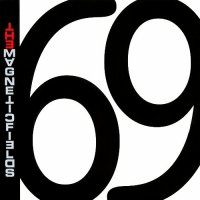
STEPHIN MERRITT: I lost interest after 69.
PHAWKER: What does is it feel like to be ‘The Cole Porter of Your Generation’?
STEPHIN MERRITT: Cole Porter was rich, I am not.
PHAWKER: Where do you live these days?
STEPHIN MERRITT: I split my time between New York and Los Angeles.
PHAWKER: Sounds elitist.
STEPHIN MERRITT: It’s also Irving Berlin-esque and Gershwin-esque. All of the classic songwriters of the day split their time between Hollywood and Broadway.
PHAWKER: Have you ever shot a man in Reno just to watch him die?
STEPHIN MERRITT: No, but the last time I was in Columbus, Ohio, I was shot at. I was getting out of a car and walking into a bar when a bullet whizzed right past me and ricocheted off the parking lot.
PHAWKER: Speaking of which, have you ever voted for a Republican?
STEPHIN MERRITT: No, but I convinced my mom to vote Republican once. I convinced her to vote for William Weld, a moderate Republican, instead of John Silver, a Democrat that could be described as a fascist, for governor of Massachusetts.
PHAWKER: Do you recycle?
STEPHIN MERRITT: Yes, but I hold it in contempt, at least in New York City, where it seems to benefit organized crime and nobody else.
PHAWKER: Which is your favorite of the Ten Commandments to break?
STEPHIN MERRITT: I suppose the one about ‘have no God but me’ since I don’t believe. I was actually raised Tibetan Buddhist, but it never took. I have fewer beliefs than most people do, it seems.
PHAWKER: Safe to say you believe in science, though?
STEPHIN MERRITT: The scientific method will do until a better one comes along.
PHAWKER: Have you ever been arrested?
STEPHIN MERRITT: No, but I was almost arrested once in England. I was standing on the street and the cops walked up and grabbed the guy standing next to me and took him away.
PHAWKER: Babyface beats the rap! Have you ever knowingly killed someone?
STEPHIN MERRITT: Just the unborn.
PHAWKER: Provocative! Have you ever told a homeless person that you didn’t have any money when in fact you did?
STEPHIN MERRITT: I have this strange reflex that when people ask me for money I immediately say ‘Thank 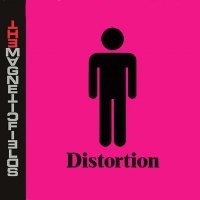 you.’
you.’
PHAWKER: Cruel but effective, I imagine. Answer me this: Is writing a song for Volvo selling out? And if so, is that necessarily a bad thing?
STEPHIN MERRITT: I don’t care. I don’t think in those terms, and anybody that does think in those terms probably isn’t gonna ‘get’ the Magnetic Fields in the first place.
PHAWKER: The new Magnetic Fields album, Distortion, is sort of a homage to The Jesus And Mary Chain. What drew you to them back in the day?
STEPHIN MERRITT: They seemed like a final drop of Modernism eeked out of the sponge that most thought didn’t have any more juice left in it.
PHAWKER: What do you know now that you wish you knew then?
STEPHIN MERRITT: How to play the harp. So, I have been taking lessons.
MAGNETIC FIELDS: I Hate California Girls
Welcome to another edition of Phawker Music Television! This week we bring you this gloriously spiteful fuzz-pop confection from Magnetic Fields’ new barbwire-kissed Distortion — a great song in search of a video, if ever we heard one. And so we worked some of our Hollywood magic. Hat’s off to The Wook for the concept and execution, you can head over to Wookified to see the uncensored version. In closing, we would just like to say ’some gave their all’ and nobody knows that better than Paris Hilton, bless her little waxed-hairless Chihuahua heart.
***
RE-BROADCAST NEWS: Q&A With Barack Obobble
This first ran on Phawker back in the late 1960s. Curiously, it seems more relevant today.
***
THE CHANGELING: Q&A With Christopher Buckley
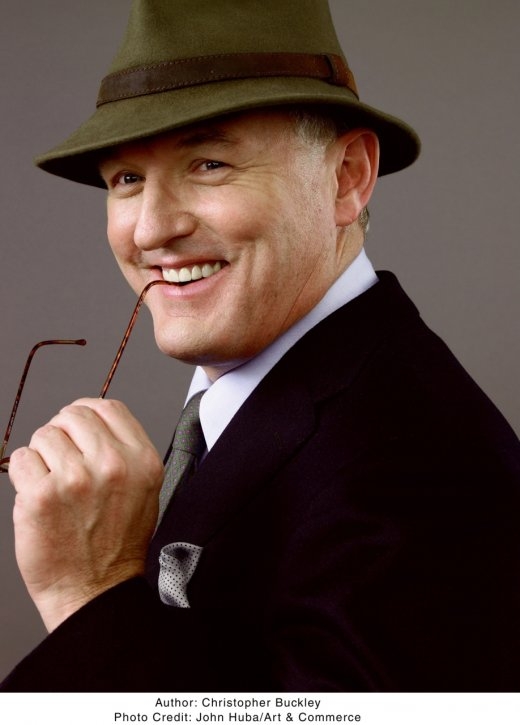
Christopher Taylor Buckley is an American political satirist and accomplished novelist. His books include God Is My Broker, Thank You for Smoking, Little Green Men, The White House Mess, No Way to Treat a First Lady, Wet Work, Florence of Arabia, Boomsday, and, most recently, Supreme Courtship. Tom Wolfe calls him “one of the funniest writers in the English language.” Recently, he made headlines when he publicly endorsed Senator Barack Obama for President. In advance of his appearance at the Philadelphia Free Library on November 5th, we spoke with the son of conservative movement standard-bearer William F. Buckley about his decision to go public with his Obama endorsement, why he’s anti-Palin, the wingnut blowback that prompted him to tender his resignation from National Review, the magazine his father founded, and how all of this augurs the end of conservatism as we once knew it…
PHAWKER: Before we get started, I must tell you something about your father. When I was a boy, my grandfather, an ardent Conservative, tried his best to groom me into a young Republican. He would always give me his copy of the National Review when he was done with it, all marked up with various passages underlined for emphasis. And I read them cover to cover. But, as a lifelong progressive liberal, I am sorry to say it never took. However, your father’s 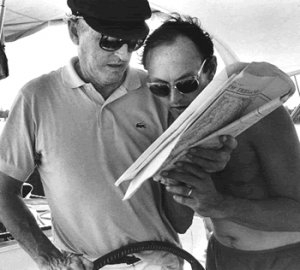 writings DID make me expand my vocabulary exponentially, just so I could understand what he was on about. So, thanks for that.
writings DID make me expand my vocabulary exponentially, just so I could understand what he was on about. So, thanks for that.
CHRISTOPHER BUCKLEY: Glad to hear it.
PHAWKER: Do you think that the kind of conservatism your father championed — rational, intellectually rigorous and curious, willing to dialogue with conflicting viewpoints — died with him?
CHRISTOPHER BUCKELY: I prefer to think not, but on the other hand it is certainly not in rampant evidence these days. But to quote my father, ‘I don’t believe in permanent victories or permanent defeats.’ Arthur Schlesinger viewed American politics as cyclical and spoke of 30-year cycles. I think we are at the end of one, and the beginning of a new one. Clearly this election has revealed some serious faultlines on the right, and hopefully there will be some soul-searching. As my father would say, conservatism could use a little ‘re-pristinization.’
PHAWKER: Is that even a word.
CHRISTOPHER BUCKELY: [chuckles] If my father used it, it’s a word.
PHAWKER: Do you think your endorsement of Obama absolves what is arguably the one stain on your father’s legacy: His early opposition to the Civil Rights movement.
CHRISTOPHER BUCKELY: Not at all. I don’t think I have it in me to absolve my father of anything. He repented of that by the end of the 60s, and even wrote an article for LOOK magazine in 1970 called WHY AMERICA NEEDS A BLACK PRESIDENT.
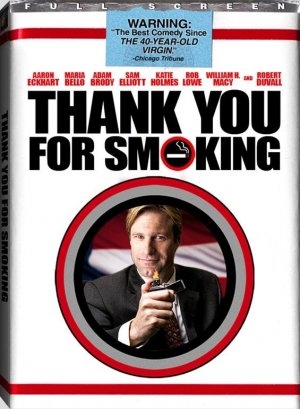 PHAWKER: What was the tipping point in your decision to endorse Obama?
PHAWKER: What was the tipping point in your decision to endorse Obama?
CHRISTOPHER BUCKELY: In a word: Palin.
PHAWKER: Do you still consider yourself a Republican?
CHRISTOPHER BUCKLEY: To paraphrase Ronald Reagan, I did not leave the Republican party, the Republican party left me.
PHAWKER: Your next book is a memoir about losing your mom and dad, which is slated for publication in the spring. You still call your dad ‘Pup.’ Is it healthy for a grown-ass man to call his dad ‘Pup’?
CHRISTOPHER BUCKELY: I have been calling him that since I was two. Would you prefer that I call him ‘Mr. Buckley’?
PHAWKER: Touche.
***
Q&A: Conversation With An Okie Noodler

BY JONATHAN VALANIA Brad Beesley has been the Flaming Lips in-house documentarian and videographer since the mid-90s. Just about any Flaming Lips video you have seen was made by Brad Beesley. He is also the director of Fearless Freaks, the excellent Lips documentary released a few years back, culled from literally hundreds of hours of interviews and performance footage that Beesley shot over the course of the last 10-plus years. Concurrent with his work on Fearless Freaks, Beesley also served as cinematographer for Christmas On Mars, the just-released low-rent 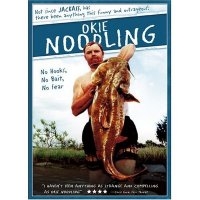 sci-fi thriller the Lips made in Wayne Coyne’s garage.
sci-fi thriller the Lips made in Wayne Coyne’s garage.
Back in 2000, Beesley made Okie Noodling, a documentary about the curious backwoods Oklahoma past time of catching catfish with your bare hands. We are talking real fucking big catfish, like, 65 pounds. And the way you catch them is you stick your hand in the murky holes that pit the sides of muddy creeks where catfish nest and get them to bite down on your hand. Basically, your hand is the bait, and your arm is the fishing rod. From there it becomes a struggle between man and catfish. While the practice of hand-fishing, or ‘noodling’ as they call it in Oklahoma, was fairly obscure prior to Beesely’s documentary, that would soon change. The response to the film surprised Beesley. The BBC, Jimmy Kimmel, The Food Network and ESPN all wanted a piece of the action, sending film crews down to Oklahoma to cover the annual hand-fishing competition that Beesley started.
“To be honest, I was just looking to give my film a climactic ending and since then it’s turned into this annual event with people coming from all over the world to compete,” says Beesley, speaking on the phone from his current home in Austin, Texas. Beesley soon realized a sequel was in order to document the international phenomenon Okie Noodling had triggered. Hence, Okie Noodling 2, which screened last night at the First Person Arts Festival.
PHAWKER: So I just saw Christmas On Mars, which I enjoyed as much as anything I ever saw on Mystery Science Theater 3000. It’s like the garage band equivalent of a sci-fi film.
BRAD BEESLEY: That makes sense, since about a third of it was filmed in Wayne’s garage. I am glad it was fairly 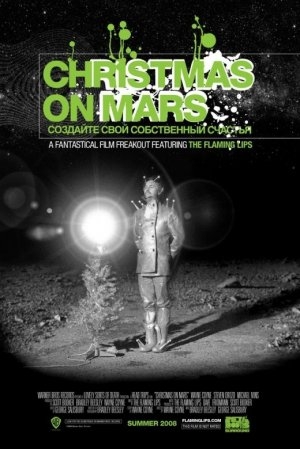 coherent because shooting without a script, you never know what is going on in Wayne’s head. The film is supposed to take place over the course of 24 hours, but in reality it took six years of filming on and off.
coherent because shooting without a script, you never know what is going on in Wayne’s head. The film is supposed to take place over the course of 24 hours, but in reality it took six years of filming on and off.
PHAWKER: The cameos — Sam Rockwell and Fred Armisen — really kick things up to another level, what with having actual professional actors involved. How did they come about. I am assuming both those guys are Lips fans.
BRAD BEESLEY: Exactly, the Lips would be playing LA and people would come back stage and say ‘I am a huge fan, I am working on this film, you should do some music for it’ and Wayne would go ‘Sure, we’ll do some music for you, as long as you come to Oklahoma and appear in OUR film.’
PHAWKER: Any big names that got away?
BRAD BEESLEY: Hmm, Frodo was supposed to be in the movie but it never happened. And Isaac Brock from Modest Mouse was in the film, but his part got cut out in the editing.
PHAWKER: Elijah Wood? The film could have used a hobbit come to think about it. I am sure everyone asks you about that scene in Fearless Freaks where Steven Drozd talks about his heroin addiction and you practically show him shooting up.
BRAD BEESLEY: We wanted to be really honest about a very dark chapter in the life of Steven, which had a huge impact on the band, mostly for the worse. There were some in the Lips camp who refused to be associated with the film if that scene was included. We had lots of discussions about it, and originally there was very explicit footage of him shooting up, which was really disgusting, Steven bleeding all over the place. Eventually we came to the 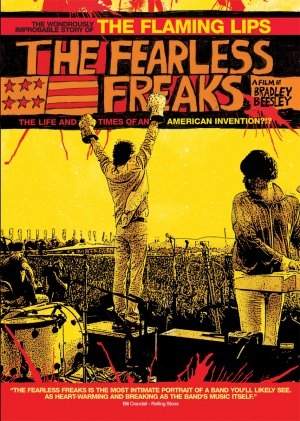 compromise you see in the finished film, where the actual shooting up is off camera, but the viewer gets a real sense of the horror of it. I am happy to report that that was the second last time that Steven did heroin, and he has been clean and sober since 2001. When we first started shooting Steven was in very bad shape. He only weighed, like, 161 pounds, was missing six teeth and had a huge cyst on his forehead. Today he is healthy, happy and married with two beautiful kids.
compromise you see in the finished film, where the actual shooting up is off camera, but the viewer gets a real sense of the horror of it. I am happy to report that that was the second last time that Steven did heroin, and he has been clean and sober since 2001. When we first started shooting Steven was in very bad shape. He only weighed, like, 161 pounds, was missing six teeth and had a huge cyst on his forehead. Today he is healthy, happy and married with two beautiful kids.
PHAWKER: Glad to hear it. So how did you first learn about this practice of catching catfish with your bare hands?
BRAD BEESLEY: When I was a kid and would go to family reunions in southern Oklahoma, I noticed that my cousins had all these cuts and scrapes on their arms. And I was like ‘How did that happen?’ And they were like ‘noodlin’. And then they explained what ‘noodlin’ was, and the image of them catching these giant catfish with their bare hands was just burned into my mind. And somehow I went from the guy who never in a million years do this, to a guy who not only noodles, but hosts an annual noodlin’ competition every year.
***
STRAIGHT OUTTA BIRDLAND: Q&A with Ben Ratliff
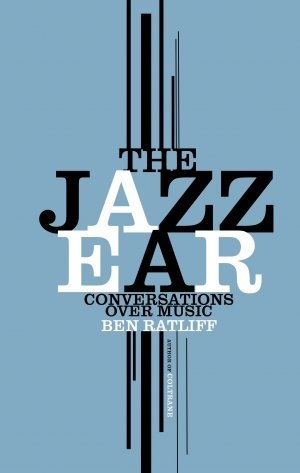 BY DAVE ALLEN Ben Ratliff has been the jazz critic for the New York Times since 1996. His reviews of live performances – produced at a rate of nearly one per night, always with a keen ear and a sharp word – always aim for the heart of the sound, and his newest book, The Jazz Ear: Conversations Over Music, strikes out for the same territory by a different path: through the words of the players themselves. He’ll be in Philadelphia tonight for a “conversation over music” with pianist Orrin Evans, an adoptive Philadelphian who’s made an impact on Ratliff’s home turf.
BY DAVE ALLEN Ben Ratliff has been the jazz critic for the New York Times since 1996. His reviews of live performances – produced at a rate of nearly one per night, always with a keen ear and a sharp word – always aim for the heart of the sound, and his newest book, The Jazz Ear: Conversations Over Music, strikes out for the same territory by a different path: through the words of the players themselves. He’ll be in Philadelphia tonight for a “conversation over music” with pianist Orrin Evans, an adoptive Philadelphian who’s made an impact on Ratliff’s home turf.
PHAWKER: Going into these conversations, are you ever worried that one or both of you might clam up – that you might step on one another’s toes or cross some uncrossable line? How did you keep that from happening?
BEN RATLIFF: Nah, we’re all grownups, doing the best we can out here, and in some cases the musicians seem relieved to talk not about their new albums, but about bigger ideas that have been lurking deep inside them. Jazz musicians, categorically, are fairly deep on what they do. And in the absence of mass adulation and the problem of how to furnish their third house, I think they have some time to think about more basic questions, like what music is for.
PHAWKER: On the other hand, does it ever get too wild or tangential? At what point would you have to rein someone in and say “So, back to the piece…”
BEN RATLIFF: Yes. Early on, my editor called these pieces “Smoking pot with Ratliff.” After that, it became a point of pride with me to push the conversations as far out as possible. (With some people this is hard; with others this is very easy.) Then you edit, or you do what you have to do so that the logic seems trackable. That can’t happen on tour, in front of audiences–too boring. But good things can come from long, woolly conversations, if you have some time to squeeze the juice out. There is no substitute for knowing where the musician is coming from, but I don’t believe that one always has to ask the perfect question. Sometimes a dumb question, badly phrased, can start a good volley. The conversations did get pretty far out there, especially with Wayne Shorter and Ornette Coleman. But a journalist becomes used to bringing someone back to the piece, no matter what it’s about.
PHAWKER: How did you get hooked up with Evans for this event? We know he can play, but what made you think he’d have something to say?
BEN RATLIFF: I’ve known Orrin for ten years, since I was stunned by him at a gig in New York. He can play, yes. He’s also a good spieler. He’s provocative, and he likes to talk about how to connect with audiences, how to get the message out there.
PHAWKER: For many fans of pop or rock music, their model for how to listen to music comes from the early critics like Lester Bangs, or perhaps from Rob Gordon in High Fidelity. What do you think those fans could learn from the way jazz musicians listen?
BEN RATLIFF: The phrase “jazz snob” is common parlance, but jazz musicians tend not to be snobs. In fact they 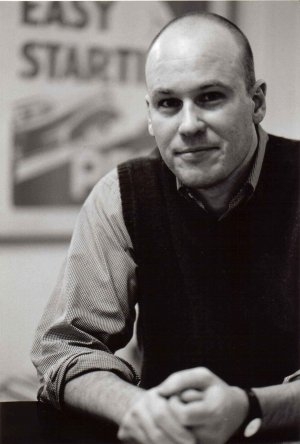 tend to be almost crazily open-minded. Jazz is a jumping-off place to enter into practically any kind of music in the world. Perhaps for this reason its musicians listen to just about everything. If it isn’t compositionally interesting, they’re curious about the performer’s stagecraft. If the stagecraft is non-existent, they’re interested in the audience. Et cetera. A lot of jazz musicians have the disoriented affect of those who have just been pulled away from focusing for hours on something extremely complicated and stimulating. You know why they seem like that? Because that’s exactly what they have been doing. And yet by and large they’re not grouchy about what they’re being asked to look at or listen to: they have been trained to believe that they can use it some way. They also–the best of them, anyway–have the best possible sense of humor: inventive and absurd and sentimental.
tend to be almost crazily open-minded. Jazz is a jumping-off place to enter into practically any kind of music in the world. Perhaps for this reason its musicians listen to just about everything. If it isn’t compositionally interesting, they’re curious about the performer’s stagecraft. If the stagecraft is non-existent, they’re interested in the audience. Et cetera. A lot of jazz musicians have the disoriented affect of those who have just been pulled away from focusing for hours on something extremely complicated and stimulating. You know why they seem like that? Because that’s exactly what they have been doing. And yet by and large they’re not grouchy about what they’re being asked to look at or listen to: they have been trained to believe that they can use it some way. They also–the best of them, anyway–have the best possible sense of humor: inventive and absurd and sentimental.
PHAWKER: How and why did you get started in criticism? What was your path to ending up at the New York Times?
BEN RATLIFF: I started listening to jazz in serious way when I was around 17 and I had a college radio-station record-library to help me. I just connected one thing to another, worked my way backwards, and found that there was more there than I could ever know. Since I wasn’t a student of history and wasn’t in training to write fiction, Jazz criticism, at the time–the late 80s–seemed to me like a better lens for understanding 20th century culture than what was available to me otherwise. What turned me on wasn’t the idea of giving out grades and consumer reports, but connecting the artist with the society around him. I wrote for little magazines, and then for the Village Voice, and then there was an opening at the Times. Once I was doing it for a living, I found that what I really wanted, ideally and at best, was to try through writing to make music seem sort of physical or tangible. I’m not someone who hears the key of D and sees yellow, but there’s something to be learned from that neurological condition: how to describe music as if it were something beautiful, sitting there in front of you. It defies reason, but so does the power of music.
PHAWKER: How do you see the intended audience for The Jazz Ear? Is it for jazz devotees who want to know how the legends really think? Or is it more for newcomers, as a resource to decode or demystify the music?
BEN RATLIFF: As objectively brilliant as Wayne Shorter or Maria Schneider or Paul Motian might be, I think lots of average listeners hear music in their own inspired ways. I’m just trying to connect the act of listening between the artist and the reader. I also think that writing about artists has hardened into journalistic forms–the review, the profile, the process piece–and I wanted to get around that.
***
Q&A: Meet The Man Who Punked The NY Times
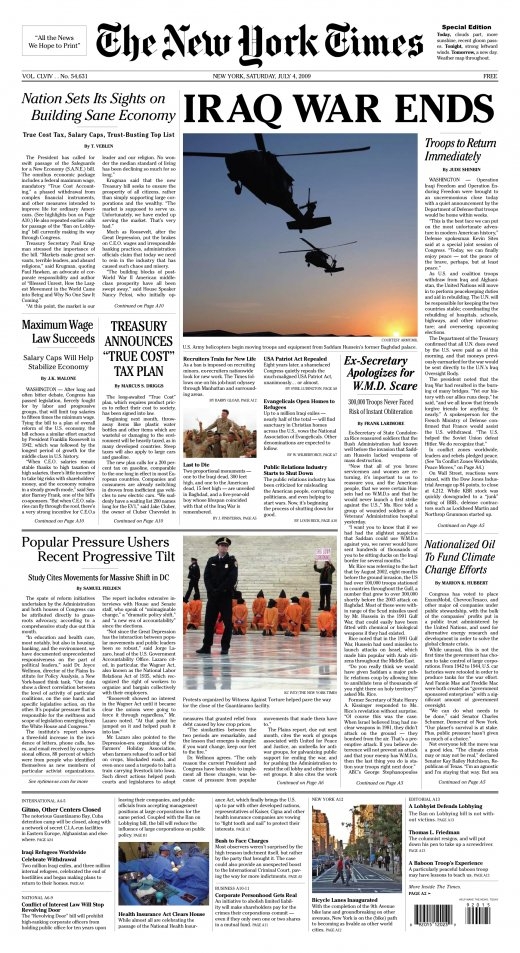
On Monday, New Yorkers awoke to astonishing news on the front page of the New York Times: The ware in Iraq was over, the troops were coming home, and Condoleeza Rice offered a public apology for hoodwinking the American people about WMDs . Furthermore, the paper said, plans were afoot to re-structure the economy away from predatory and monopolistic practices that enrich a few while exploiting the many, universal health care was a go and anybody who wanted a college education could get one on the government’s dime. Too good to be true? Well, for the time being, yes. But the whole point of this elaborate spoof of the New York Times was to point out that we-the-people have the power to make that which is currently ‘too good to be true’ a basic fixture of reality. So says Steve Lambert who, along with his partner-in-spoof Andy Bichlbaum, first hatched the idea for this elaborate media prank on a barstool in Brooklyn more than a year ago.
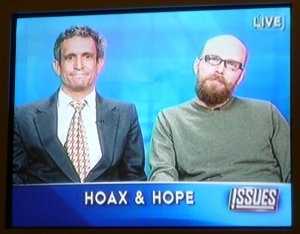 PHAWKER: So how did this idea come about?
PHAWKER: So how did this idea come about?
STEVE LAMBERT: Basically me and my buddy Andy Bichlbaum were sitting in a bar in Brooklyn. And then we put the word out to our friends. People like the ladies of Code Pink and United For Peace & Justice and it just grew from there.
PHAWKER: How many copies did you print up?
STEVE LAMBERT: 1.2 million.
PHAWKER: Wow, how much did that cost?
STEVE LAMBERT: Over $100,000. Just to be clear, we had a LOT of help with this. Over 30 writers, 100 donors and we had over 1,200 sign up to distribute copies on the street.
PHAWKER: I heard you were originally planning to do this for April Fool’s Day and then decided to wait for the outcome of the election.
STEVE LAMBERT: April Fool’s Day would have been to obvious. Our plan all along was to wait for the election, no matter who won. This wasn’t about some hero swooping in and winning the election and saving us from ourselves. The whole point is that, much like the election, change comes from the people working together.
PHAWKER: So describe your ground game.
STEVE LAMBERT: We had four trucks positioned around the city, with everyone on cell phones, constantly adjusting and adapting to circumstances. So when Gawker posted the locations of our trucks we were able to scramble them, we were able to move on a dime.
PHAWKER: What was the reaction from people on the street?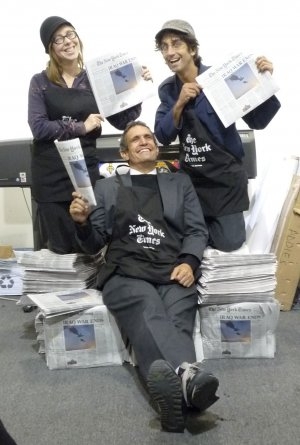
STEVE LAMBERT: Overwhelmingly positive. The first reaction when you handed people the paper and it said IRAQ WAR IS OVER was people smiling. Roughly 10% would give it back when they figured it out, but the rest were totally into it. The web site version was totally slammed. We were totally overwhelmed by the response, and we had serious web people working on our site and the response took them surprise. Our servers were slammed. Already copies are selling on eBay for $200. When the Times wrote about it, they quoted a man on the street who said ‘the Times should be flattered, this will be a collector’s item.’
PHAWKER: What was the reaction of the New York Times?
STEVE LAMBERT: We have not heard from them, but they covered it as a news story. We made a concerted effort not to come across as shrill, angry liberal activists. The whole point was to point out what is possible: The war could be over, everyone could have health care and get a college education. One article I read called it ‘a liberal fantasy.’ I don’t think peace and prosperity are the stuff of liberal fantasies. Fantasy is flying cars. Things like universal health care and government-funded college educations for all are fixtures of most Western democracies. In the end, that is the message we were trying to put across to people: None of this is currently true, but it is all possible. –As told to JONATHAN VALANIA
[Pictured above, Andy Bichlbaum and Steve Lambert on CNN last night; Liz Cole, Scott Beibin, and Andy Bichlbaum]
***
TAWK RADIO: Q&A With WIP’s Anthony Gargano

[Illustration by ALEX FINE]
PREVIOUSLY: “ Just wanted to give a little positive feedback — amazing blog! I stumbled on to the site a little while back, and it’s very well done. I think the site is thoroughly enjoyable, creative and rich! I enjoy something that will make people think or explore, that will reach them on another level. I’ve always tought if you truly want to reach people and express yourself, why settle for the topical? Reach them in a place where you force them to think. I’m not talking negatively or positively — I’m talking both, talking inspiration, whether it’s making them rethink a position they’ve had or showing them a route to something beautiful — literally or viscerally.” –Anthony Gargano, WIP
PHAWKER: Why, in your opinion, is WIP so frickin’ popular?
GARGANO: WIP is the town hall of Philadelphia. It’s loud, obnoxious, petulant, passionate, honest, sentimental and — believe it or not — smart, though not in an erudite, NPR way. Very rarely do you find a media outlet that reflects its town the way WIP does Philadelphia. I think it’s due to two reasons: Most of the shows are caller-driven, so our muddy patois — that I am also blessed with — is quite pronounced, and most of the hosts are originally from the area, even the dear departed (Mike Missanelli, Steve Martorano, Steve Fredericks). And Angelo Cataldi, well, talk about an accident of birth. If anybody SHOULD have been born here, it’s him. So basically it’s the colonial days and we’re the ones on the corner standing on a crate in front of a huge gathering of people calling Ben Franklin a dope.
PHAWKER: During the Eagles season, you don’t go to the Monday morning press conference and ask questions. Why is it that talk radio second-guesses so much, but rarely does its own reporting or break any stories, then criticizes the people who do break stories or write about them. (This question came from an embittered newspaper sports editor, obviously, as did this follow-up.) Your shtick is all Yo Cuz, etc. When does that get old and interfere with the substance, or is it all about shtick?
GARGANO: Well, I’d like to debate that embittered sports editor on a couple of those points. One, I’m on the air during Andy Reid’s news conference so I cannot go down there. Two, where in the hell did he get that “we” don’t break stories or do reporting? That’s positively absurd. While we may not be pure journalists anymore, we certainly gather information. On WIP. In the past year, I’ve had the Eagles taking Kevin Kolb (I said it in March), the Eagles signing Takeo Spikes and then releasing him a year later, by the way; the Sixers trying to trade up in the draft to Milwaukee to try to get Yi and then to Chicago to try to get Noah; the Eagles cutting Jeremiah Trotter (yes, that was easy, I did a show with him), and countless other things like guys missing flights, injuries and free agents in town, etc. And I rarely rip other media, especially print media, because I’m sensitive about it because I’ve been there and I know how much of a grind it is — and some of the difficult dynamics, like how your world shrinks when you cover a team. Your world is basically these people that you cover and they become in many ways like either your family or your captors.
Know what’s funny about that “Cuz schtick?” I don’t even play it up. “Yo Cuz” is simply my personality. Half the Mets team from 1994 still call me Cuz, as well as Bobby Bowden, Tom Izzo and a million other guys I’ve covered or [who] have been the subject of my profiles. I really do enjoy people and I’m warm and colloquial on the air, so maybe that’s what they construe as “Cuz schtick,” as well as probably the format of WIP, where we touch on some subjects outside of sports. I know it’s the big criticism — and listen, I came from doing a more national type of job and I’m a stone sports geek so I would love to talk to all of the coaches at the Final Four or every manager in MLB. But the dirty little secret is that nobody truly wants to “hear” that — most get bored. There are times when I really want to talk, say, college football and I toss it out and there are crickets on the phone line until I start talking about some game we made up as kids.
Look, when you’re on for five hours, you divulge EVERYTHING about your life and your life’s history, because you’re looking to fill content. People need you to be creative or entertaining or stimulating, and not just by some keen sports point. You have to hit them at home, too. So it happens that my childhood meshes with a lot of peoples’ here and there’s a Cuz connection, which means that Philadelphia is a small big town where the inhabitants are lot more like extended family. It’s what I love about Philadelphia — along with East Delancey Street between Second and Fifth, a beer at Monks, a tequila at Tequila’s and dinner at Mr. Tony’s (La Veranda).
PHAWKER: Tell us about your tenure at the New York Post. We hear sports editor Greg Gallo is a maniac? Can you confirm or deny?
GARGANO: Greg Gallo equals total, complete lunatic — and you know what? I fucking love him. To this day, I love him. I don’t want hear about how hard Tom Coughlin is. Try working for GG. He was relentless. When you’re a beat writer for him, he calls you every morning and says in this ol’ school New York accent: “Get me a fucking back page!” He’d send me all over the country and tell me to go knock on somebody’s door. I did more stakeouts than some cop friends I have. I spent days in a rental car in St. Pete down the street from Doc Gooden’s house, then peering through the palm trees to see if anyone was home. So Jordan retires and I’m in Chicago and he says drive to his house, knock on his door and buy him a sandwich. That’s his line, “Buy him a sandwich.”
I learned how to be a reporter under Greg Gallo, and I bought a lot of guys sandwiches — though not Jordan that time, though I wound up getting an exclusive interview. I’ve always loved the art of writing — and granted, I probably went overboard crafting sentences and paragraphs and Gallo used to break my balls about it once a week. When I would file my story he would say, “You’re wearing your pink panties again! Take your gawd-damn pink panties off. This is sports.”
PHAWKER: People are saying you guys have officially drunk the Kool-Aid for Obama. Your thoughts? In a lot of ways, it will fall to WIP to vouch for Obama’s candidacy to leery white male voters in the region. Again, your thoughts on this?
GARGANO: I liked Obama before he came on WIP. I find him bright and charismatic and, politically speaking, unsullied, though of course I say that with the huge qualifier of “politically speaking.” There’s something appealing about his freshness. Obviously there are concerns about whether there’s true substance beneath the exterior, and whether or his relative inexperience will impede what he can accomplish, but he connotes that notion of “change.” I don’t think it’s WIP’s place to vouch for anyone. If you qualify someone as a leery white voter, they probably won’t vote for him. Regardless, it’s not up to the station to make them feel more at ease with their own viewpoint. Obviously, getting Obama on the station was a coup but I cringe when I hear the station enter a political discussion. Stick to who you are: We’re a sports station with some general talk and humor mixed in. It’s not the format and we’re not experts in the political arena. If we were, we would be on MSNBC and came from the front of the newspaper — not the back.
PHAWKER: Tell me some things that nobody is supposed to know about Anthony Gargano. You are secretly a woman’s figure skating fan, you think pro sports is overrated, etc.
GARGANO: I’m addicted to “Project Runway” — I think it’s fierce — and “Top Chef.” I plan my night around the shows to watch them with my girl. I know way too much about Nina Garcia. I want to move to Spain and write novels. There’s a movie I love called Sexy Beast and the protagonist — a thief from London — has retired to a cliffside villa in Spain. The opening scene shows him baking in the sun by the pool, drinking a Heineken and smoking a cigarette — I want to do that! Instead of going to Pat’s or Geno’s at 3 a.m. on a Friday or Saturday night, I go to Chinatown to David Oh’s joint.
PHAWKER: Have you ever killed a man just to watch him die?
GARGANO: No, but I’m pretty sure my grandfather did. Or maybe he was really just a bookmaker for Angelo Bruno.
PHAWKER: Have you ever been to jail?
GARGANO: Yes, to see Mike Tyson. And when the nightclub Scruples on South Street got raided and I was 15.
PHAWKER: What is the most heroic thing you have ever done?
GARGANO: Probably getting my ass kicked for intervening when a group of guys were hassling another kid on the subway while going to class at Temple.
PHAWKER: What is your most shameful moment? If you could do ANYTHING over differently, what would it be?
GARGANO: Lots and lots of shame — I’m Catholic and I’m on the air for five hours a day. You can’t imagine how many stupid things I’ve said. If I could do anything different, I would have went away to college, which is not a swipe against Temple. But I would have received a different view of the world at that age. I also wonder what it would have been like had I stayed in New York.
PHAWKER: If you could change one thing in the world, what would it be?
GARGANO: I wish I could add compassion to the world. Instead of viewing life singularly, I believe there’s empowerment in masses and the greatest thing in the world is lifting someone else. That, and making sure the Eagles got a No. 1 wide receiver.


